Why you can trust Tom's Hardware
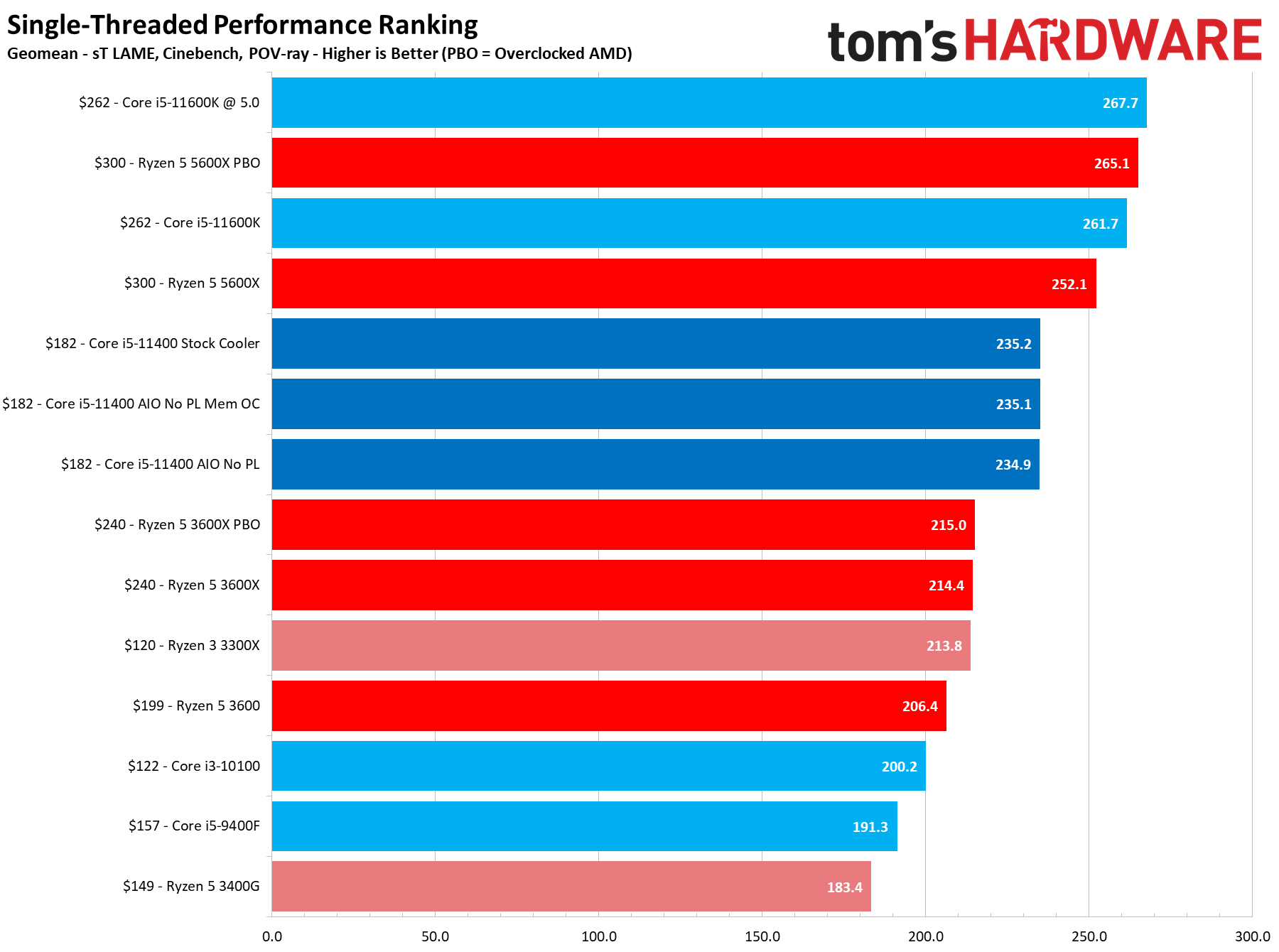
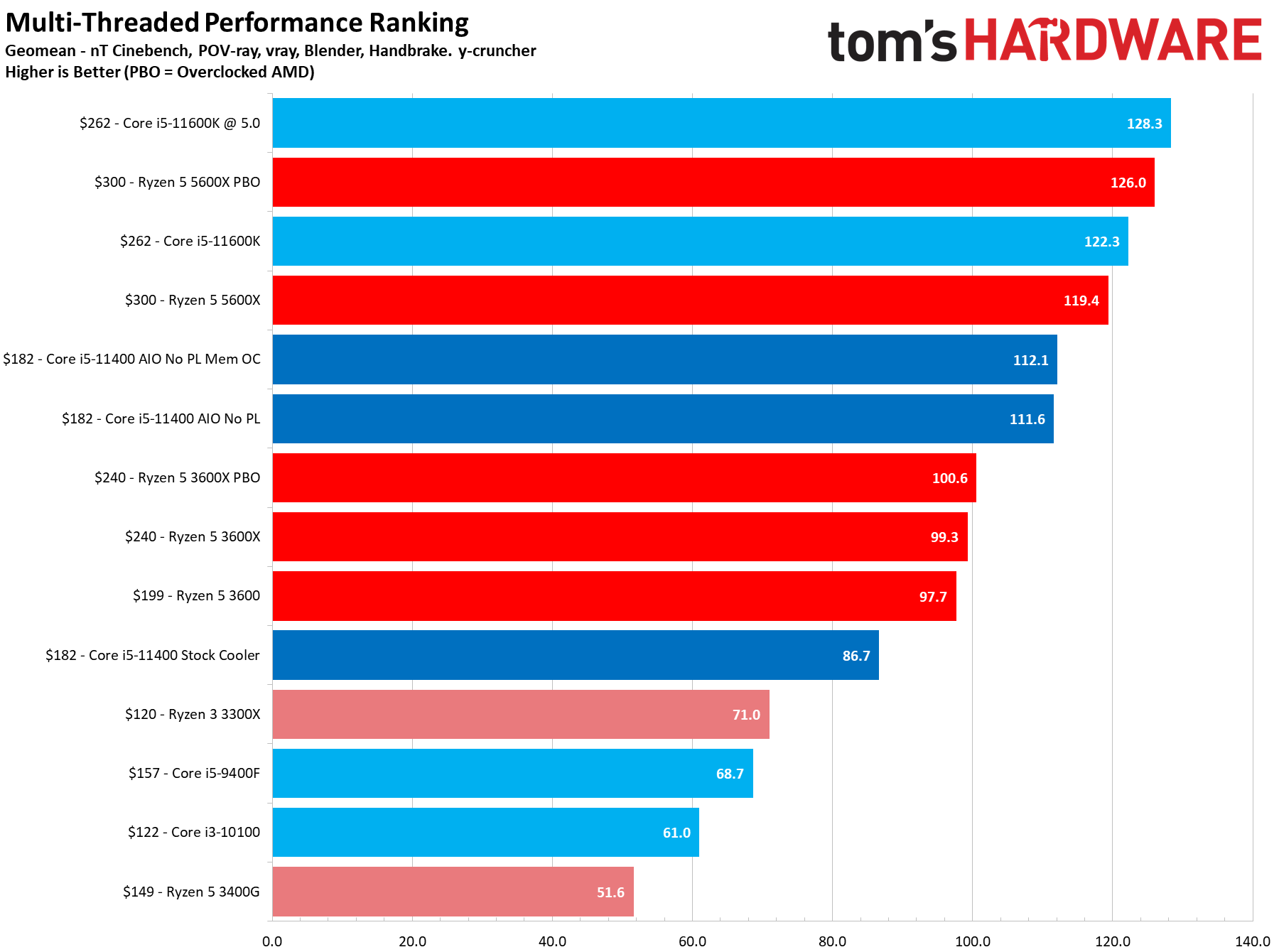
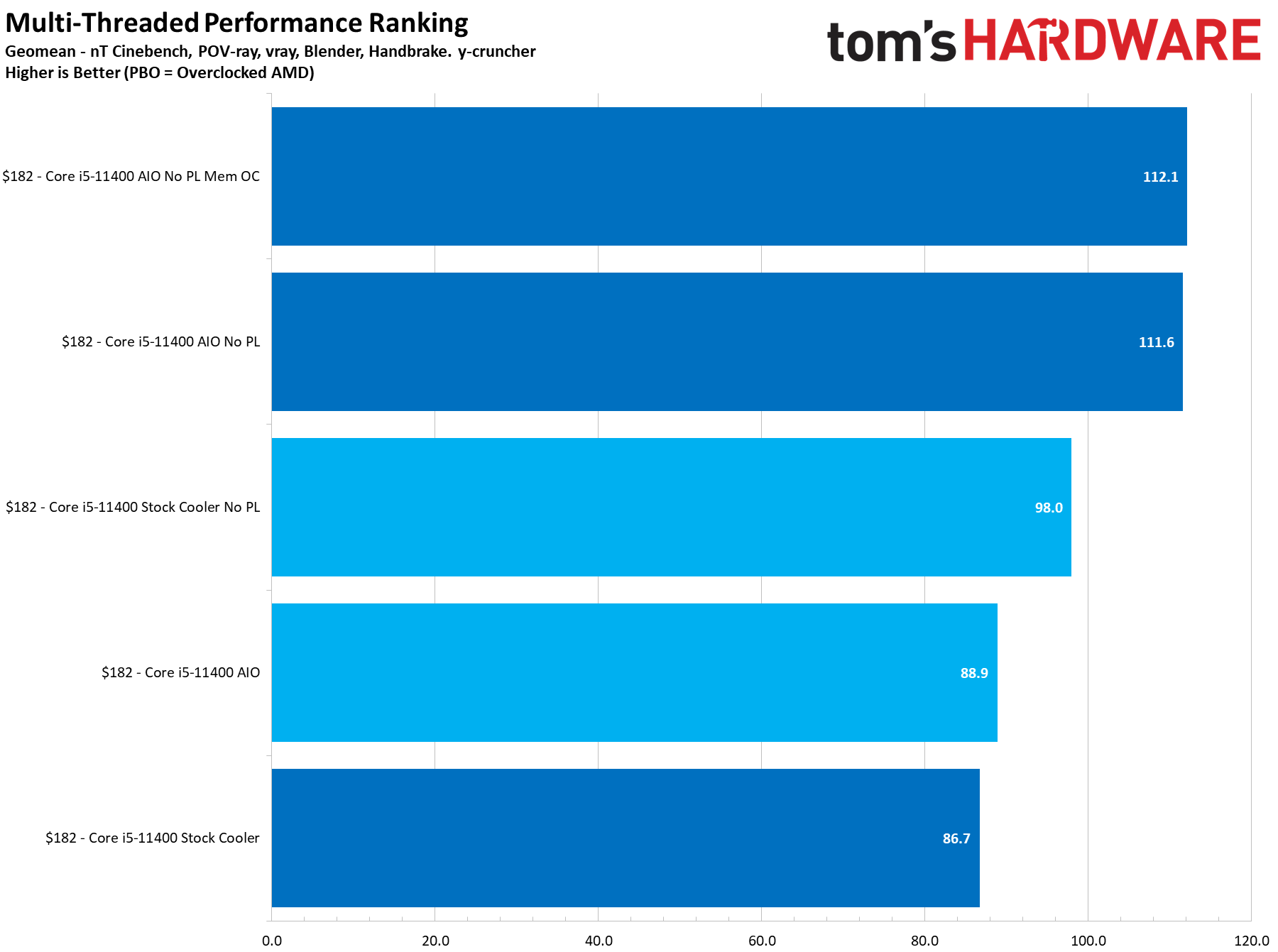
We can boil down productivity application performance into two broad categories: single- and multi-threaded. The first slide has a geometric mean of performance in several of our single-threaded tests. Here the benefits of Intel's Cypress Cove architecture are clear as the Core i5-11400 is ~13% faster than the competing Ryzen 5 3600 at stock settings and 9% faster after we overclock the Zen 2 silicon. The Core i5-11400 doesn't experience any uplift in single-threaded work from lifting the power limits, but it easily beats the comparably-priced Ryzen processors.
The geometric mean of our threaded application workload results shows that the Ryzen 3000 processors are still competitive in threaded work, which isn't too surprising because they have the same number of cores and threads. The Ryzen 5 3600 is 12.7% faster in our cumulative measurement if you top the Core i5-11400 with the stock cooler and force it to strictly adhere to Intel's recommended power settings. However, removing the Core i5-11400's power limits gives it a ~14% lead over the stock Ryzen 5 3600 and an ~11% lead over the overclocked 3600X.
Taken as a whole, the Core i5-11400 has a better blend of performance throughout our full suite of application tests below. The 11400's large lead in single-threaded work is impressive, and its seeming deficiency in threaded work is easily offset simply by topping it with a more capable cooler. With a better cooler, it matches the Ryzen 5 3600 even with the power limits strictly enforced. Additionally, removing the power limits gives it the uncontested lead in threaded work.
Rendering Benchmarks on Intel Core i5-11400
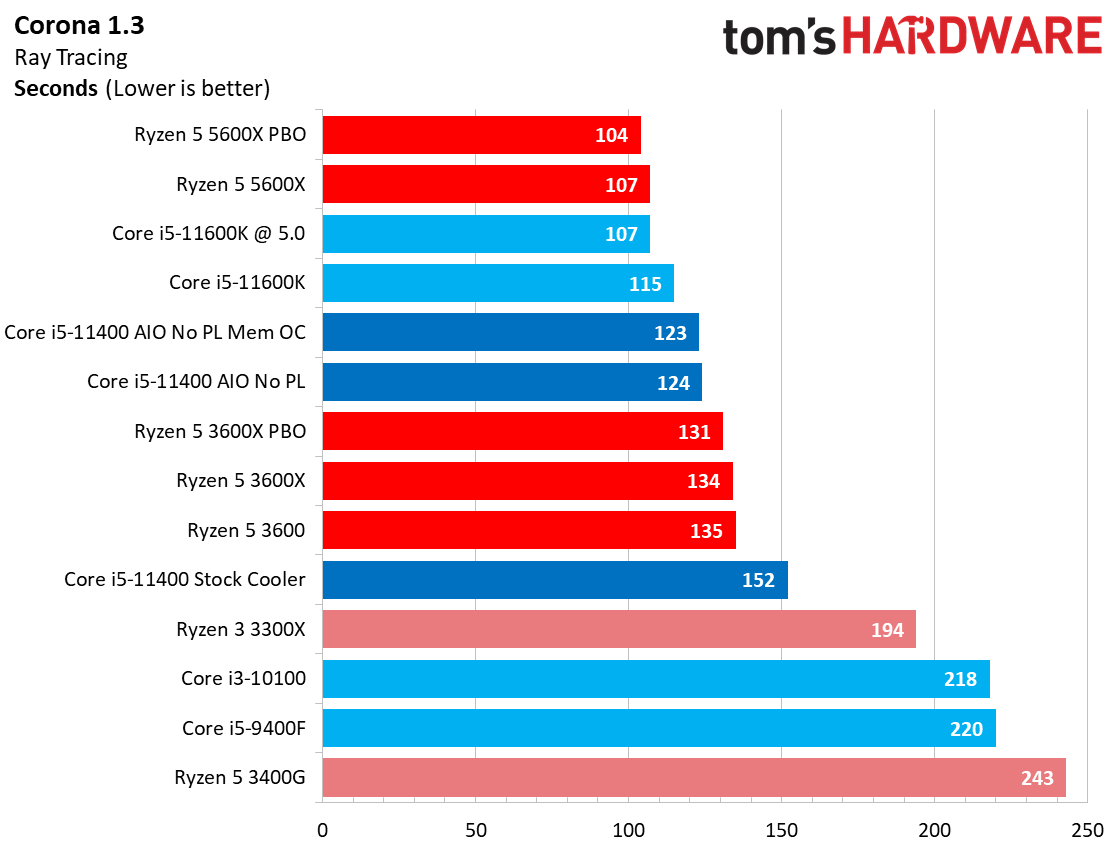
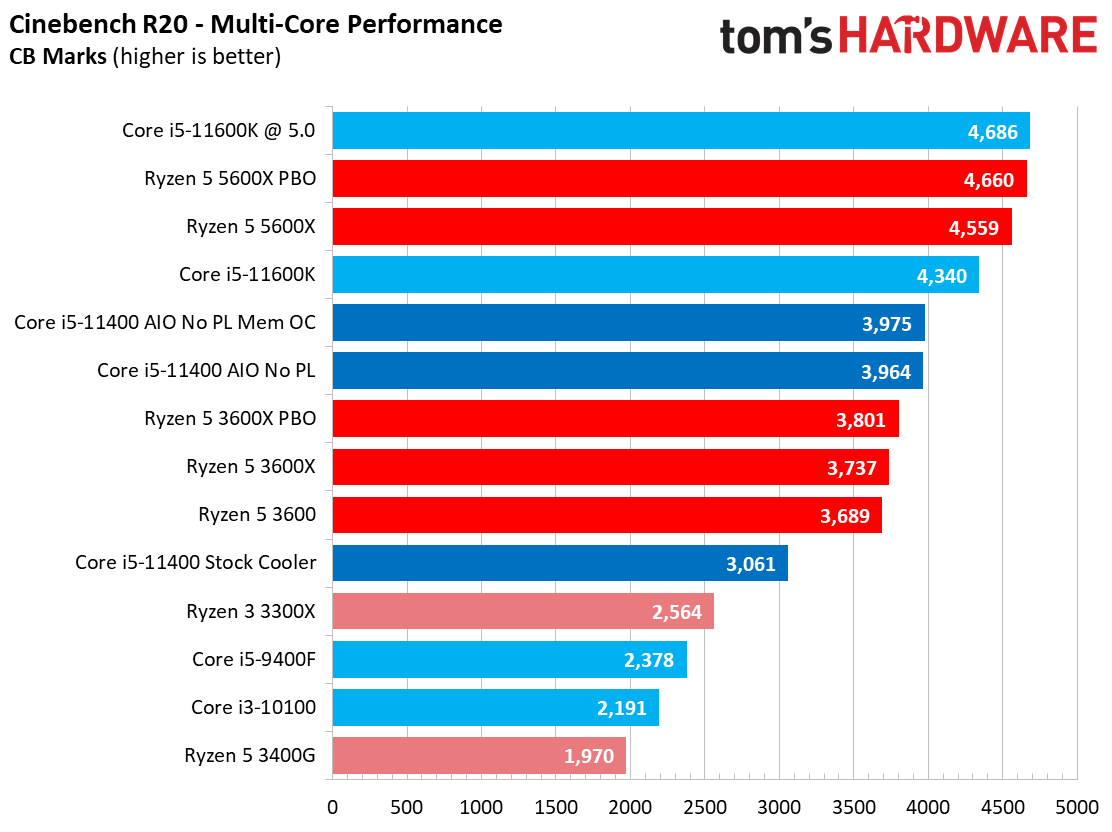
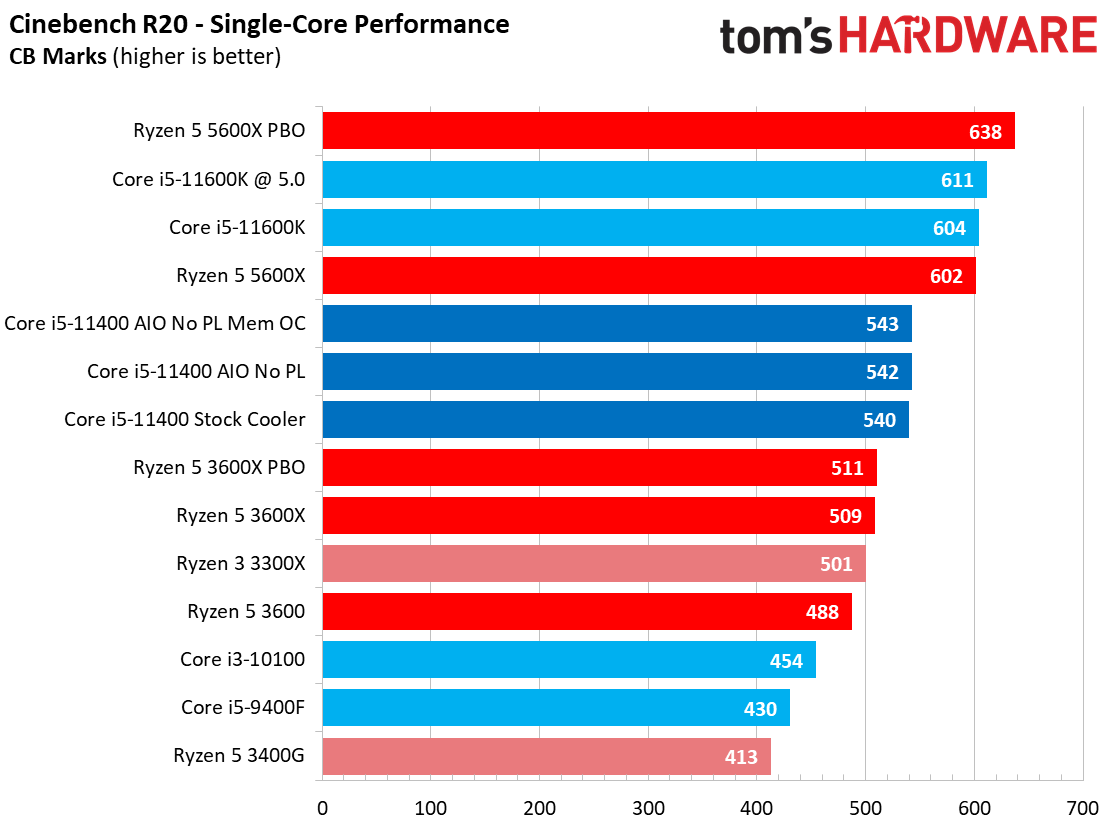
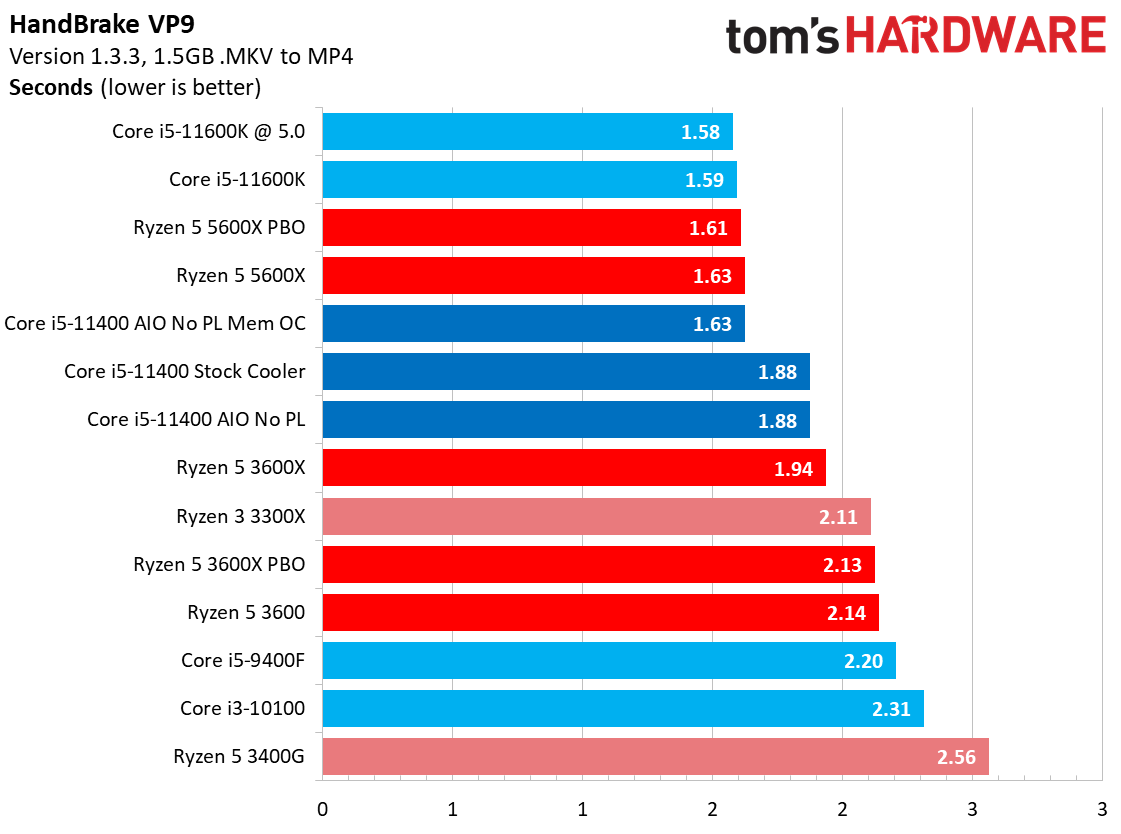
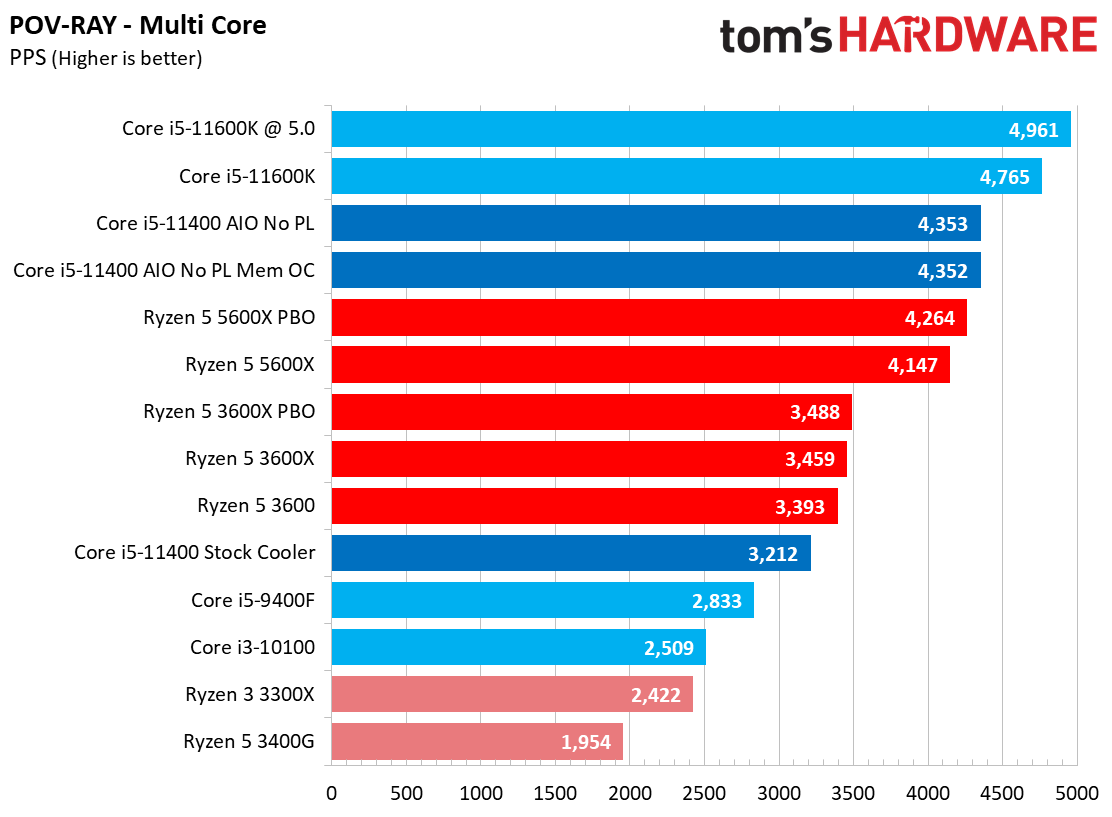
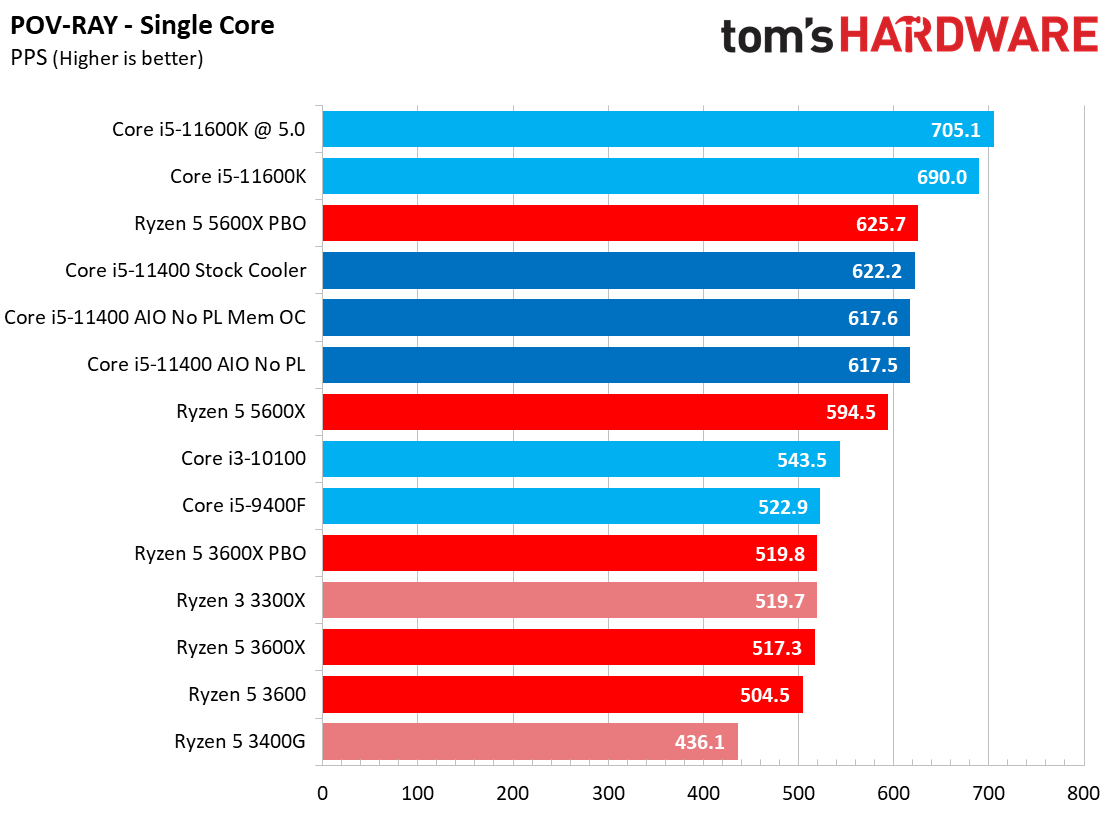
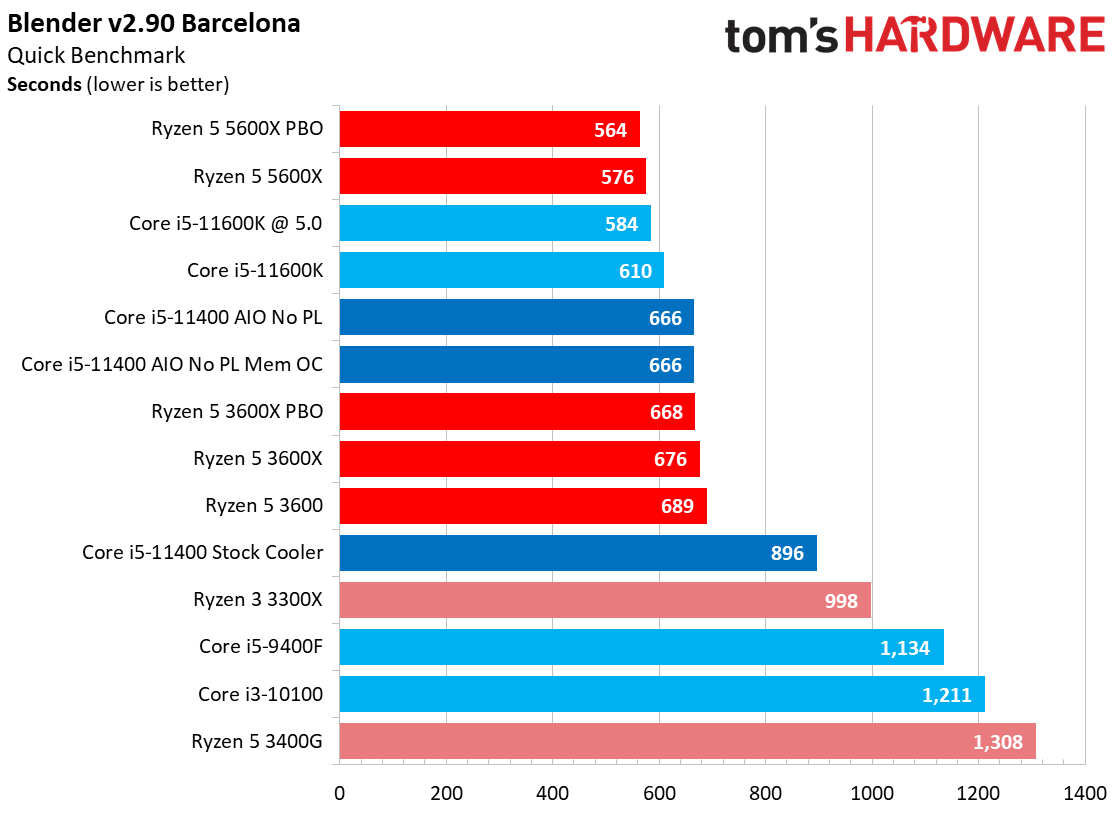
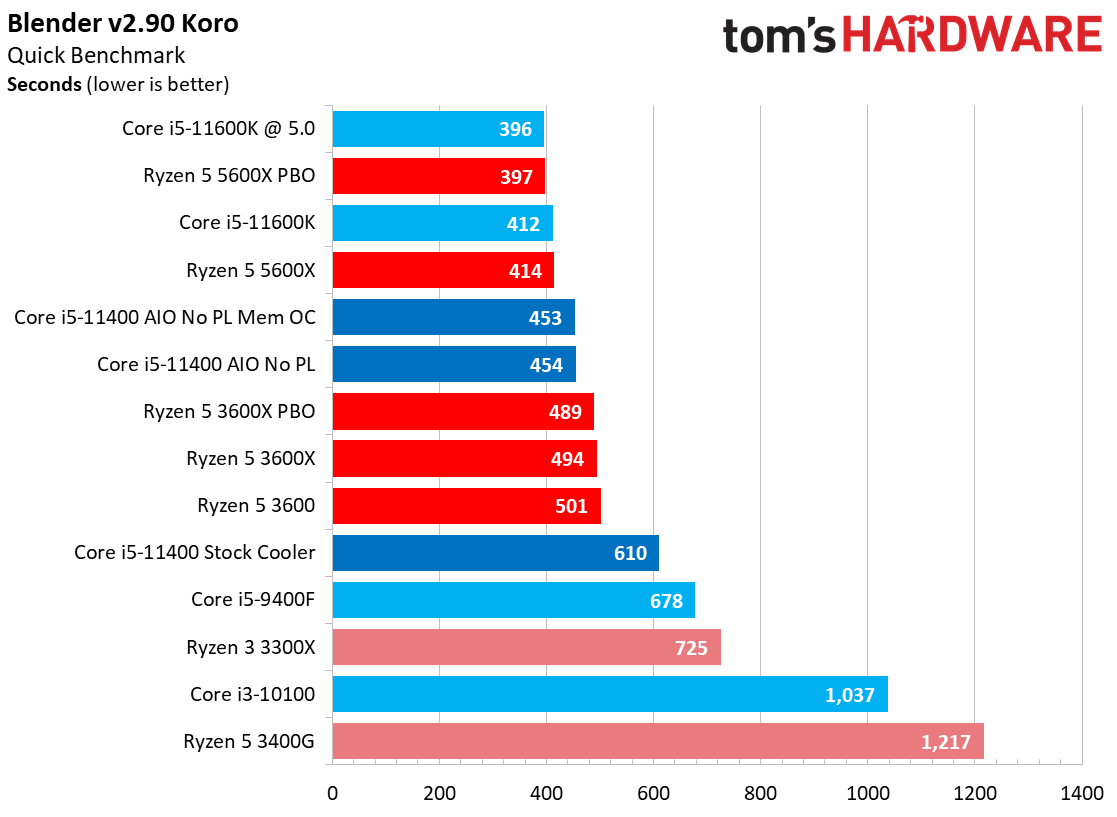
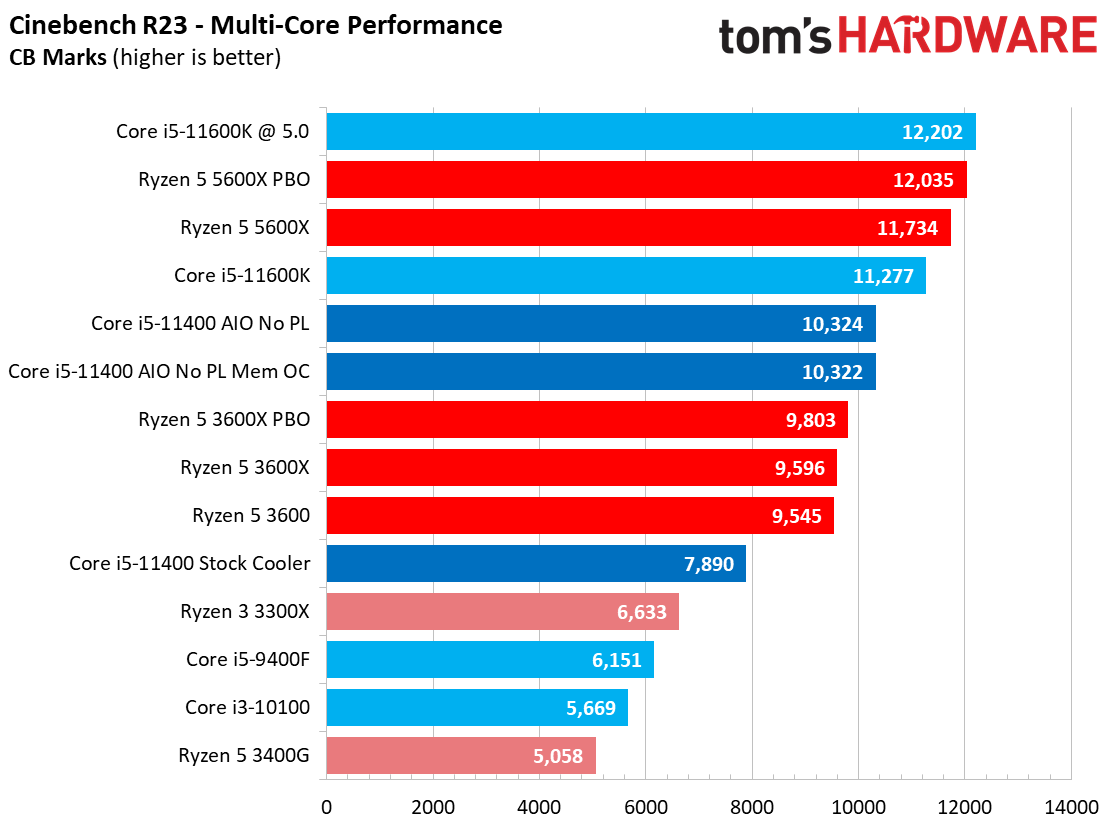
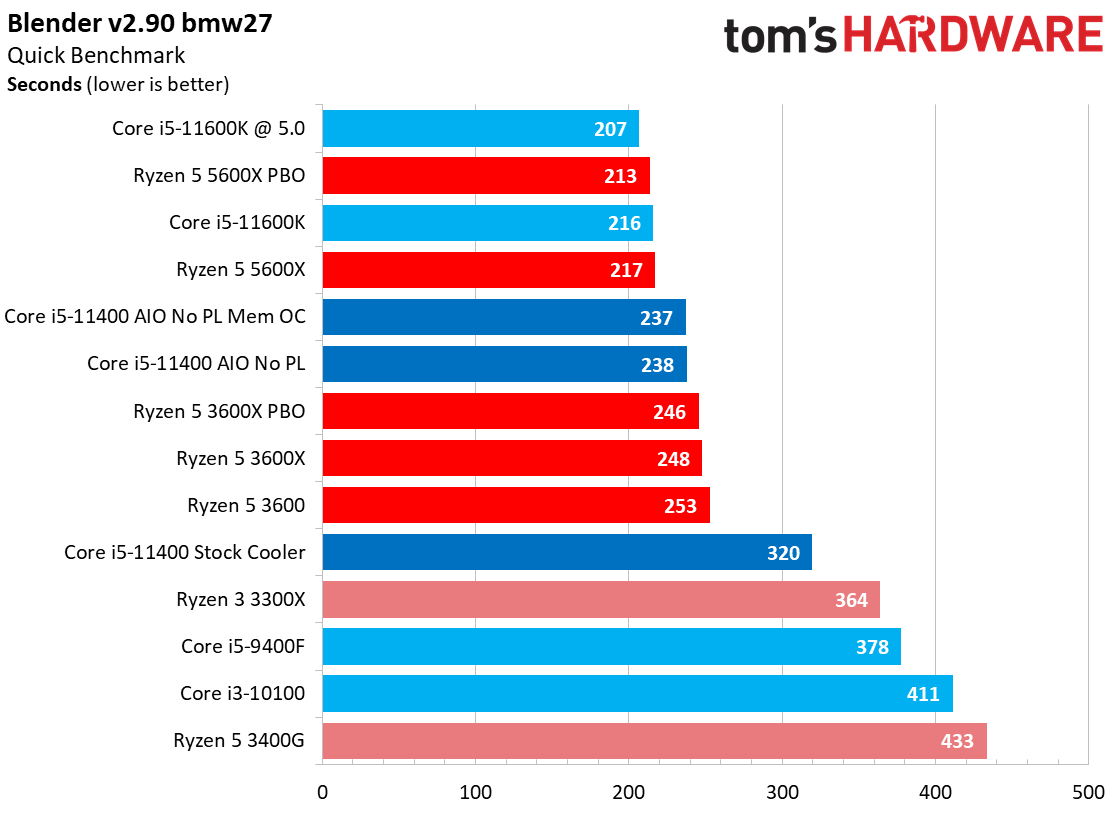
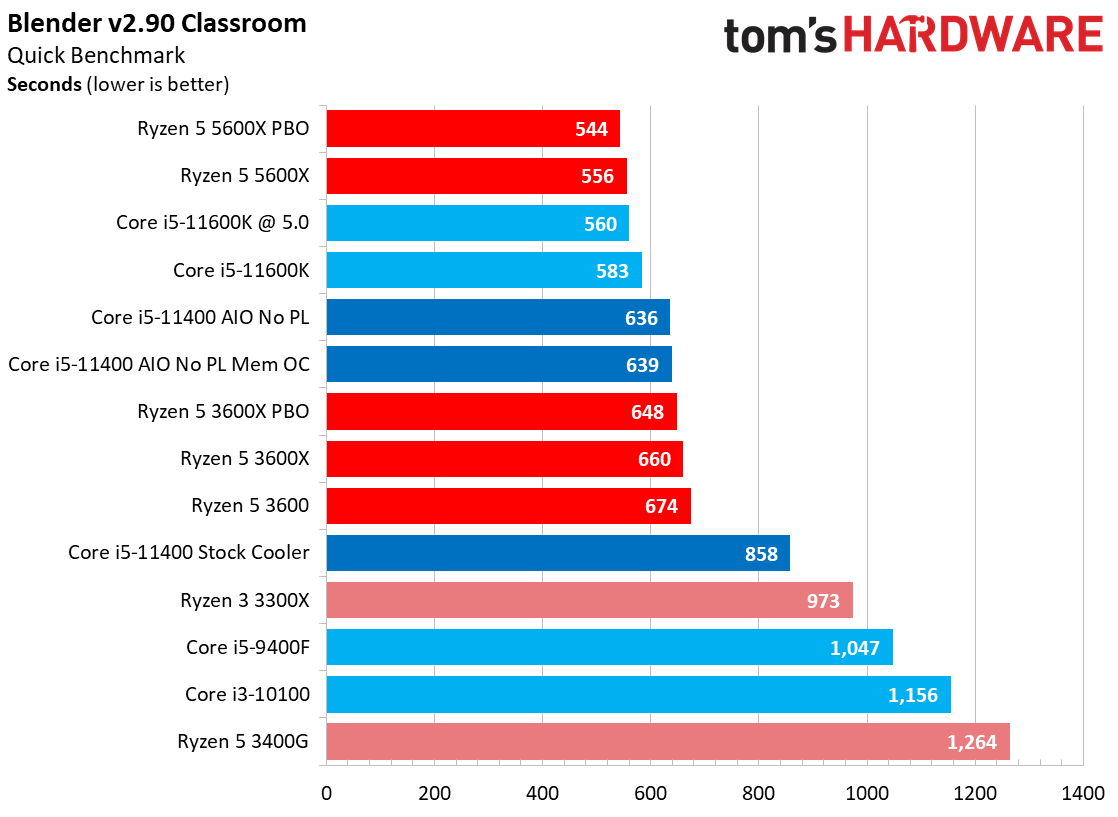
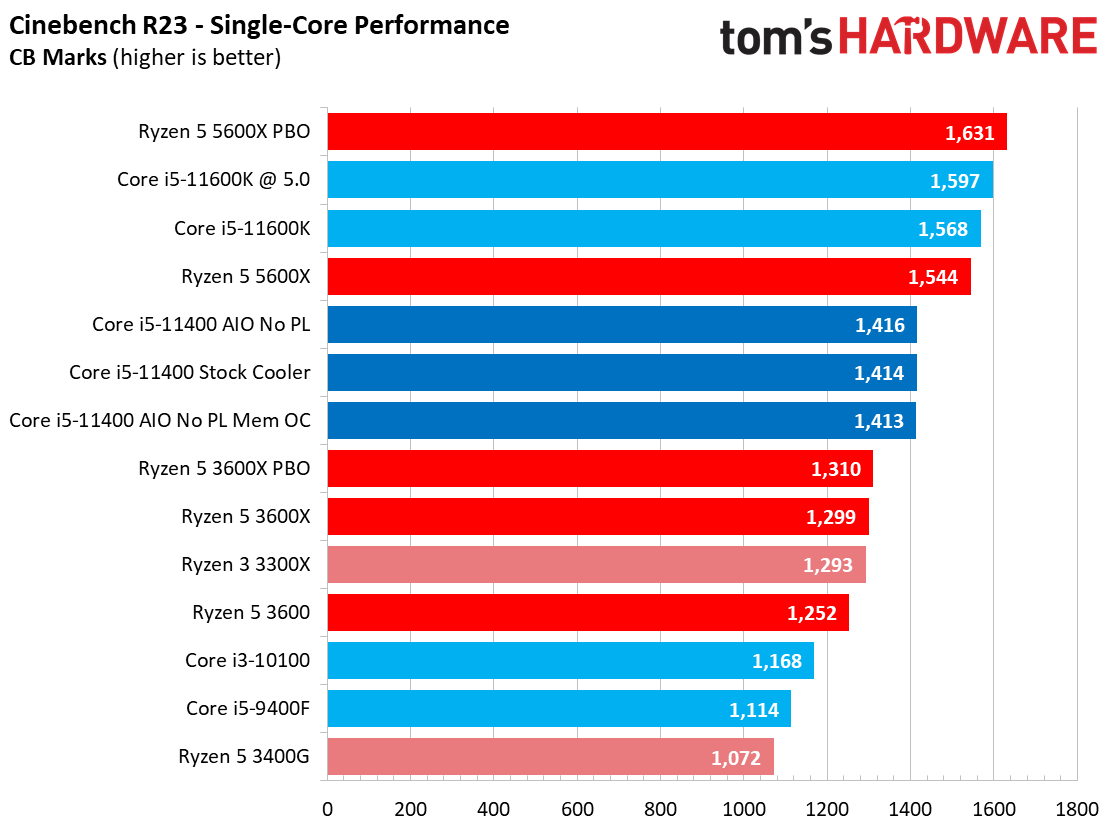
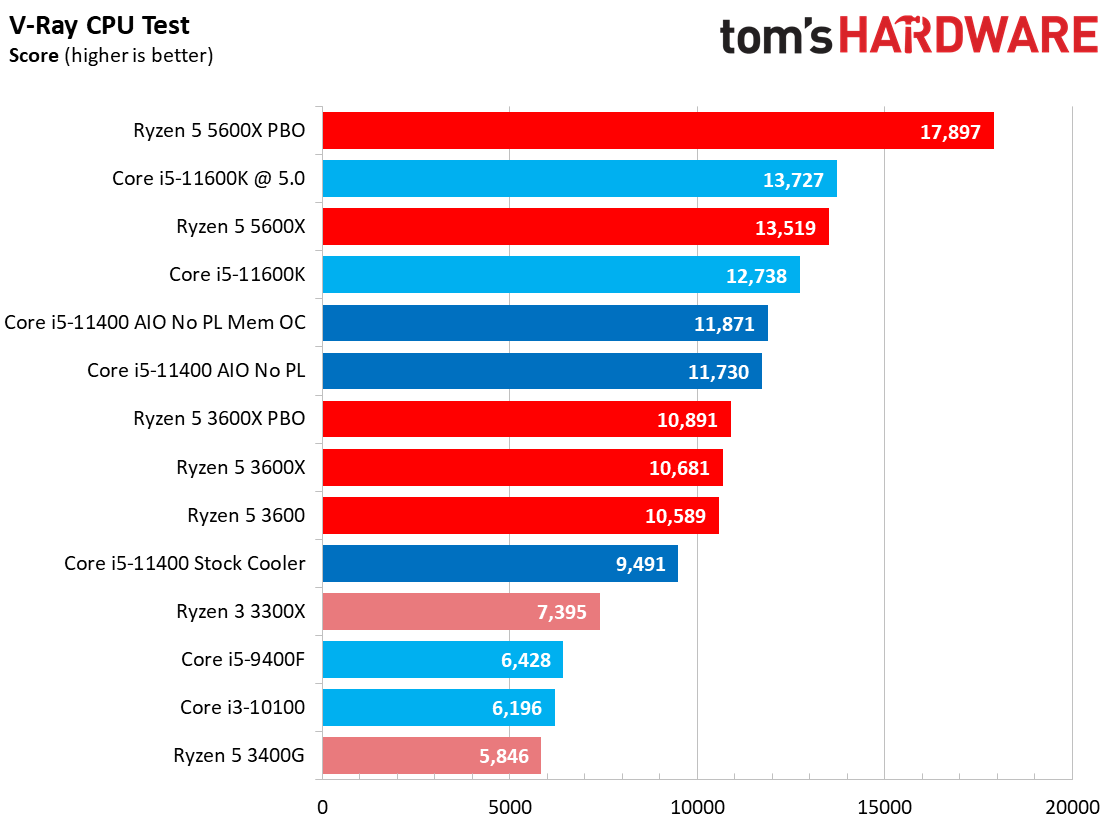
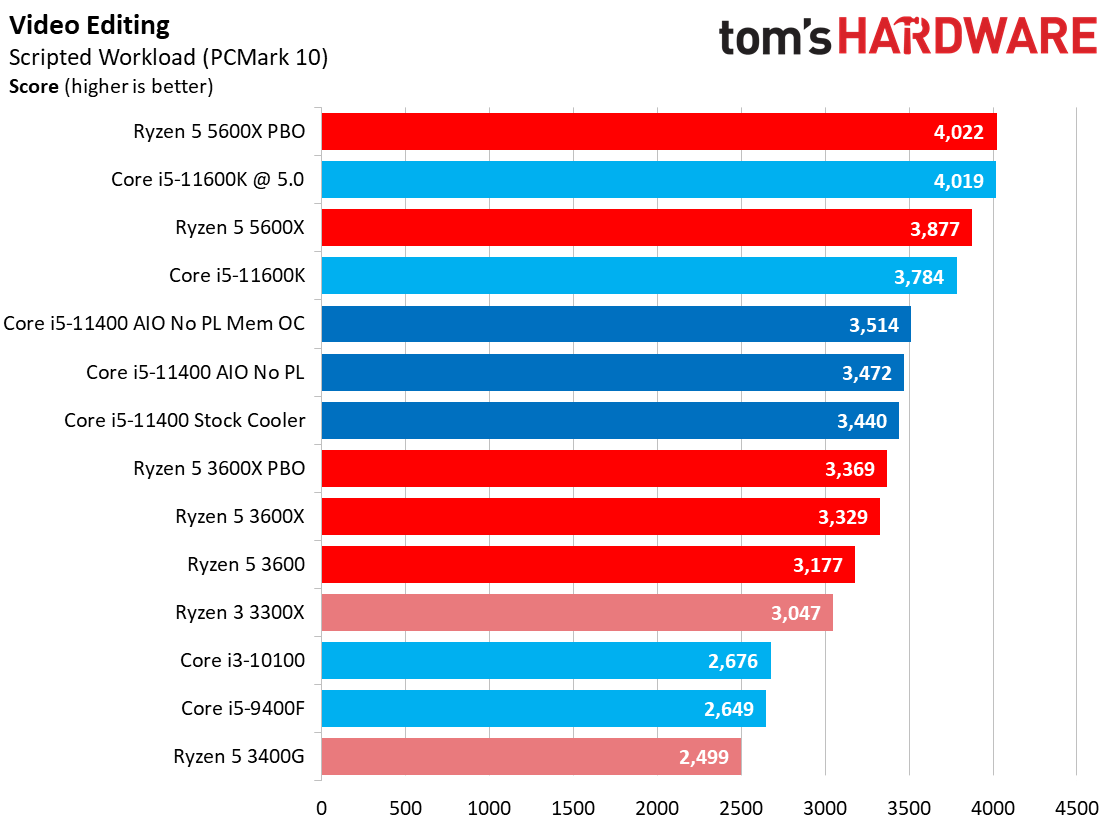
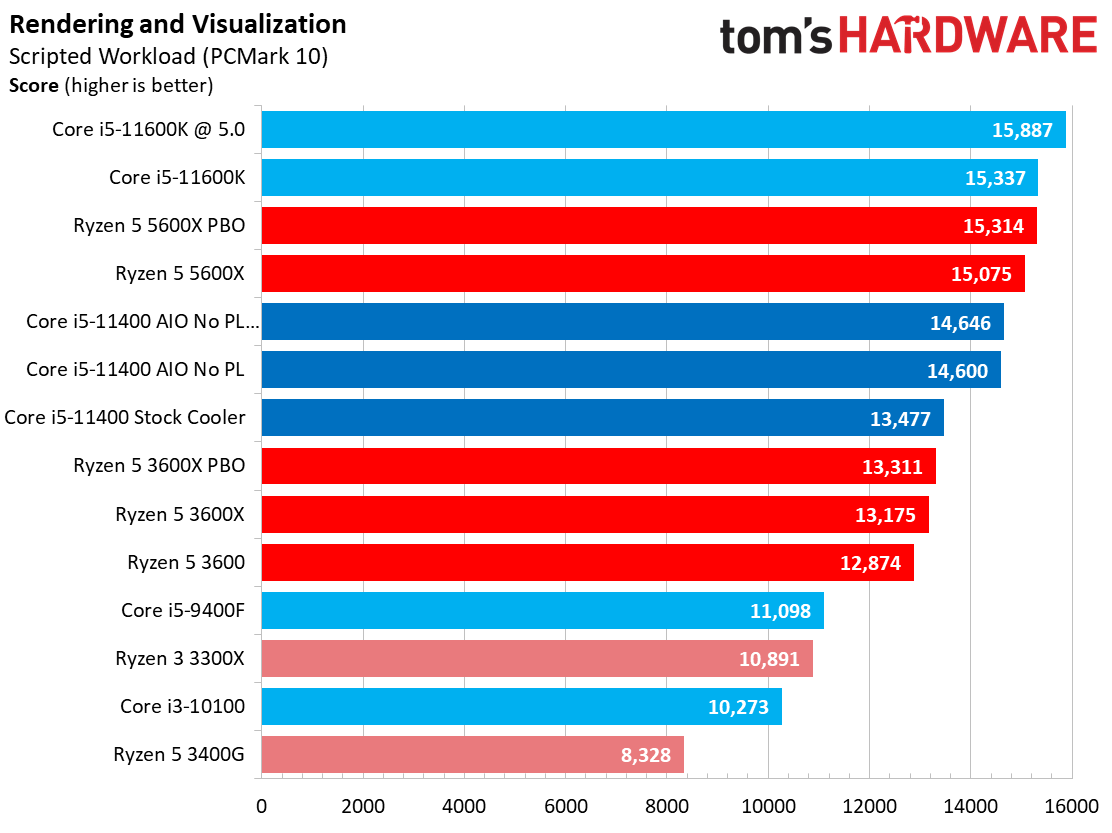
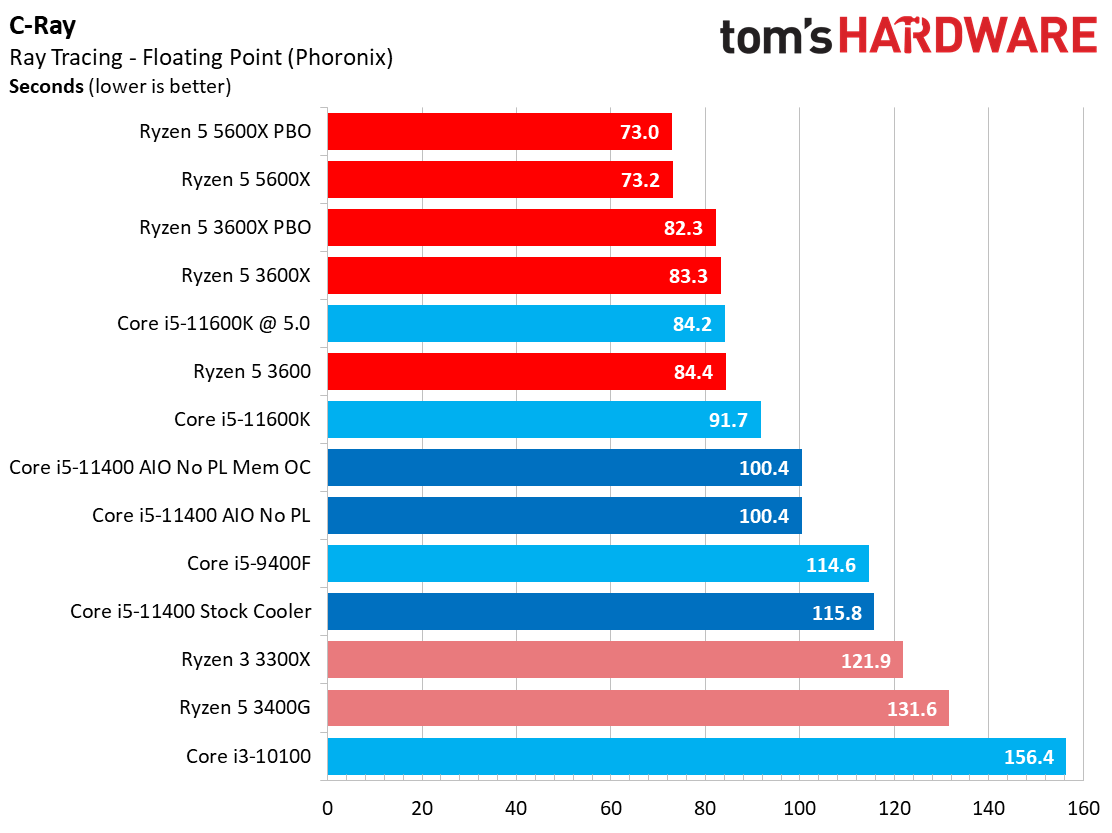
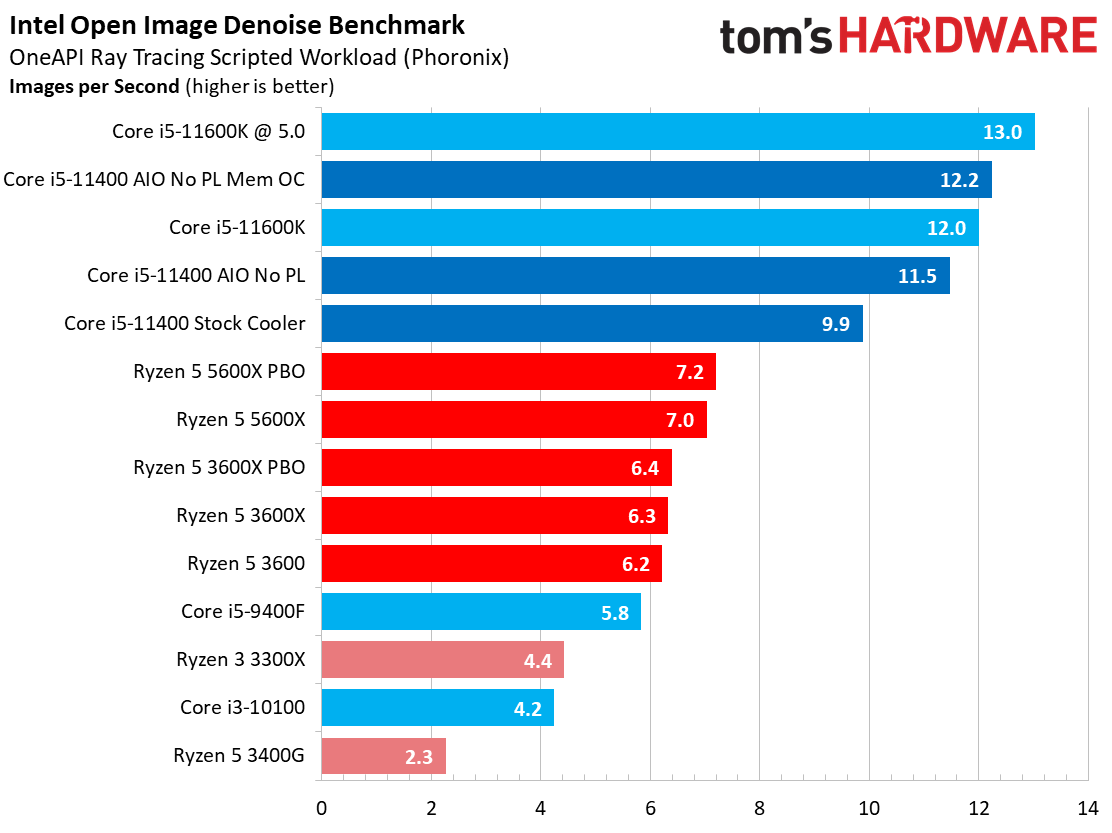
As expected given the trends we identified from the measurements above, the Core i5-11400 takes the lead in all single-threaded rendering work, including Cinbench R20 and POV-Ray.
We see more competition in heavily threaded work, with the Core i5-11400 suffering at the hands of yet another largely worthless Intel stock cooler. With the stock cooler, the 11400 loses to the 3000-series Ryzen models in almost every threaded test. However, topping the chip with a better cooler and removing the power limits gives it the lead across the board.
Encoding Benchmarks on Intel Core i5-11400
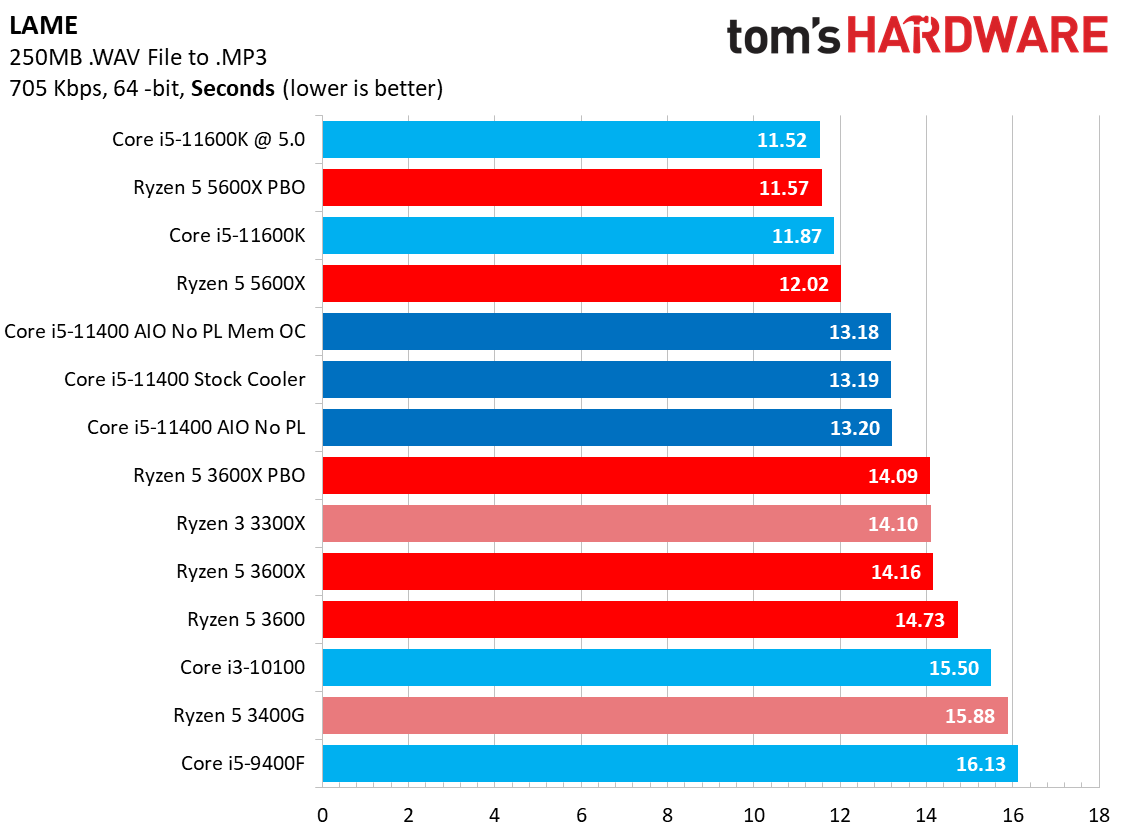
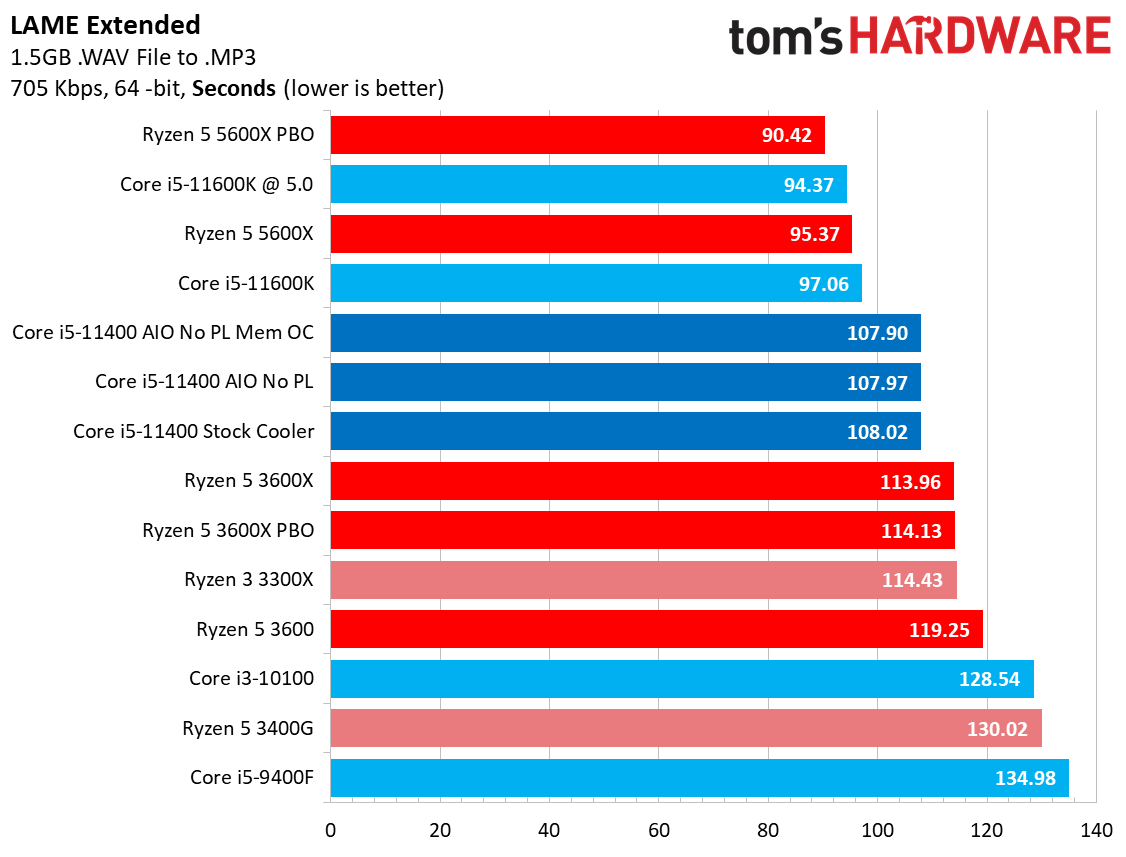
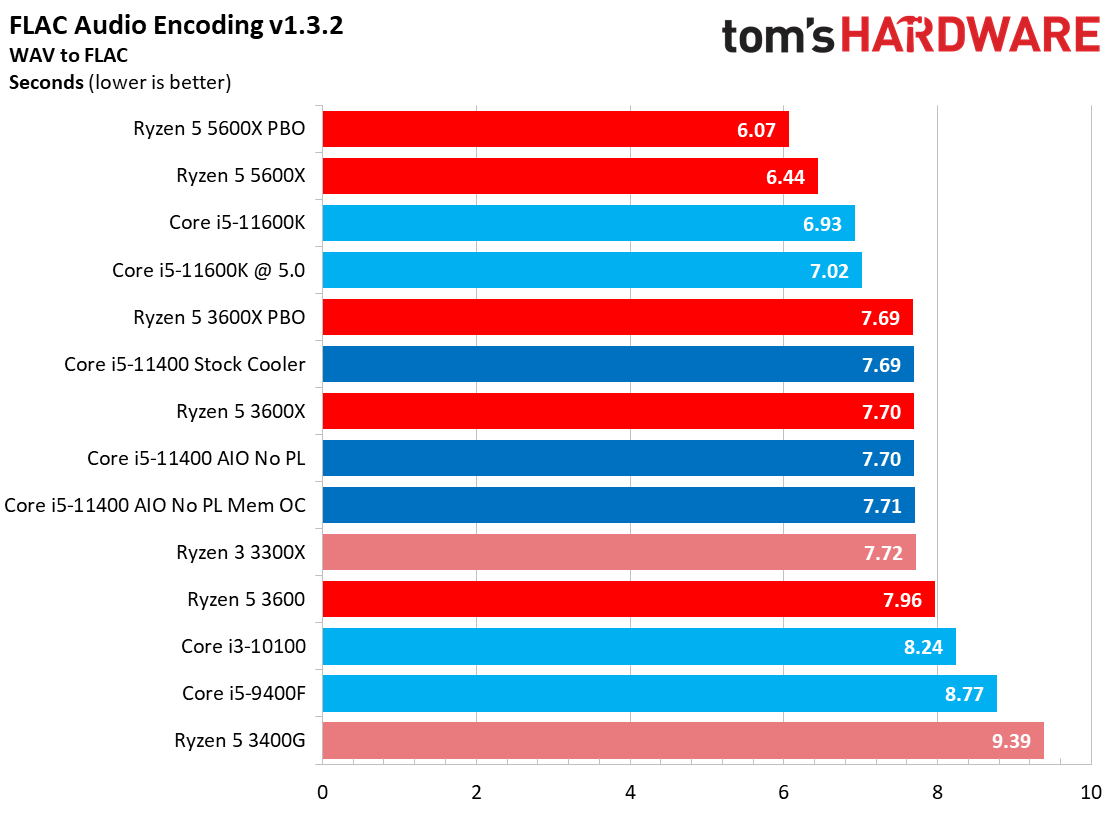
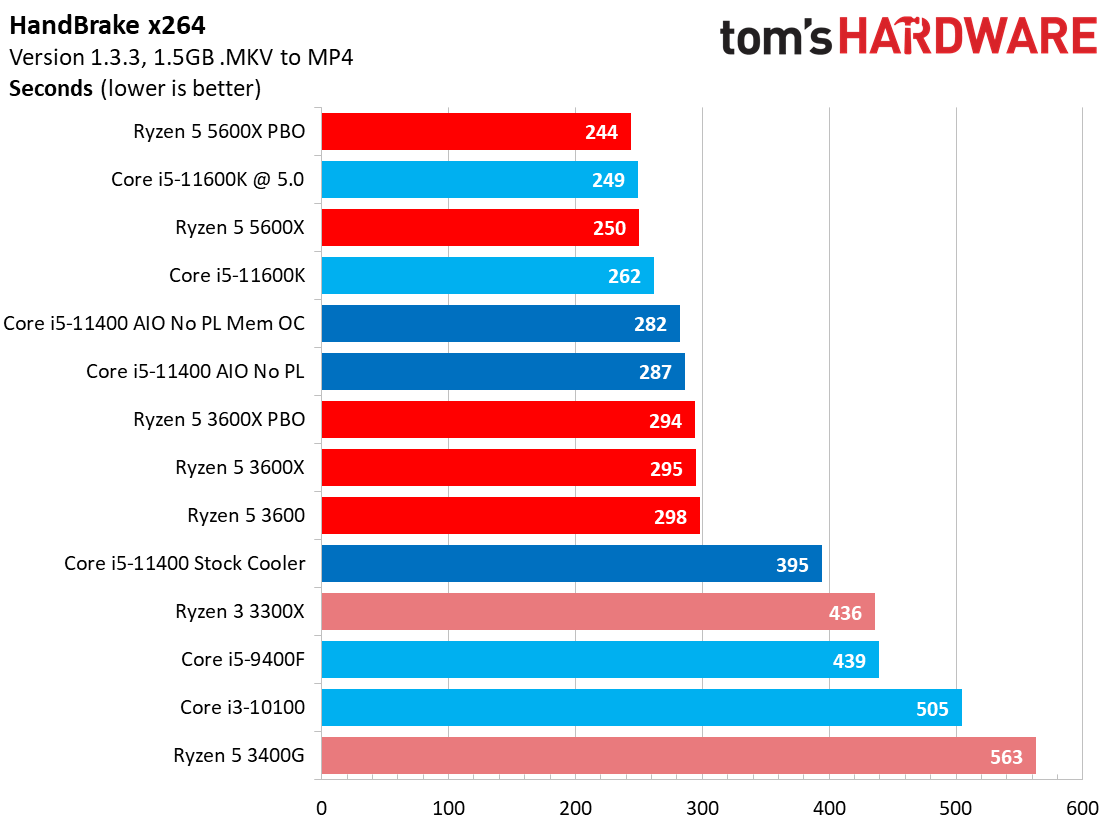
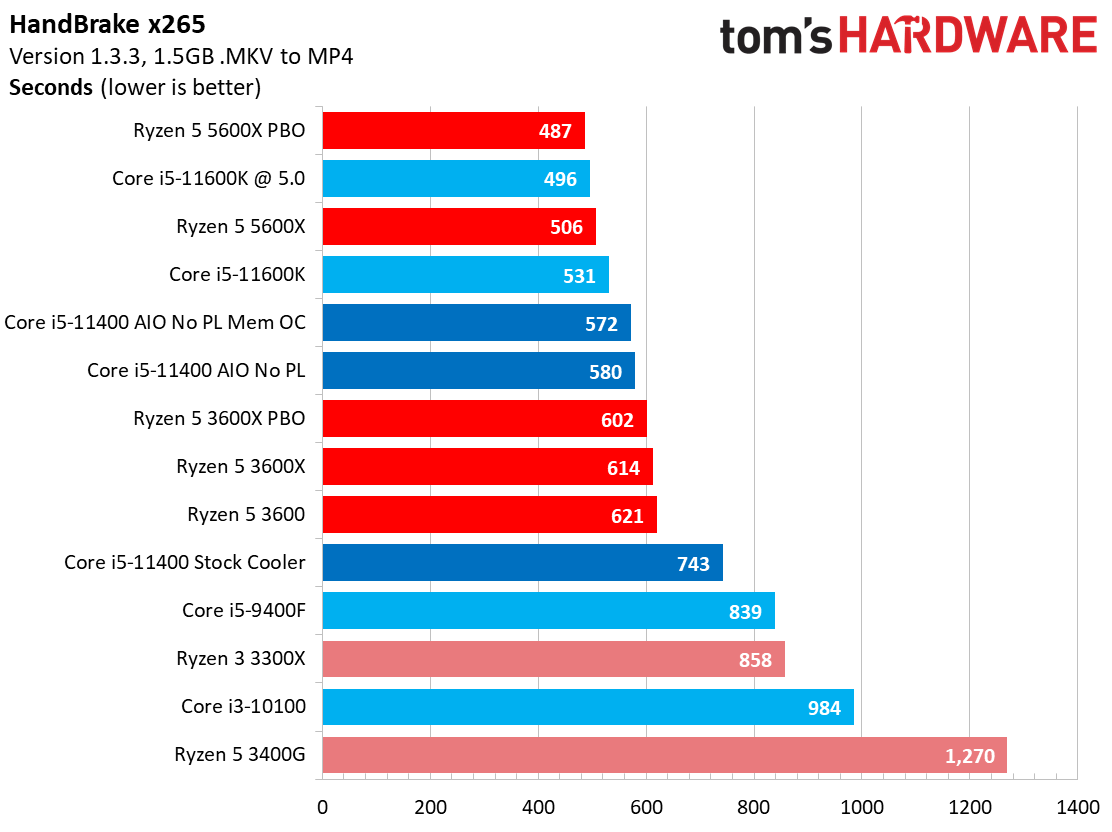
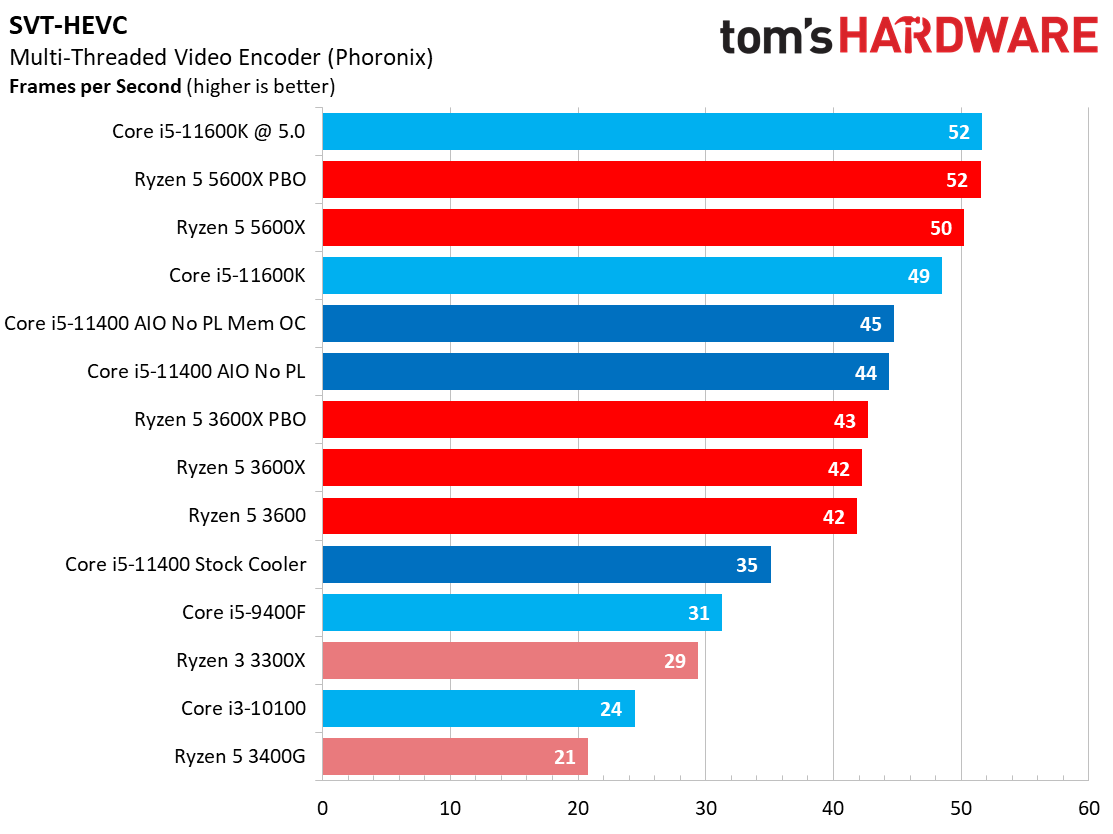
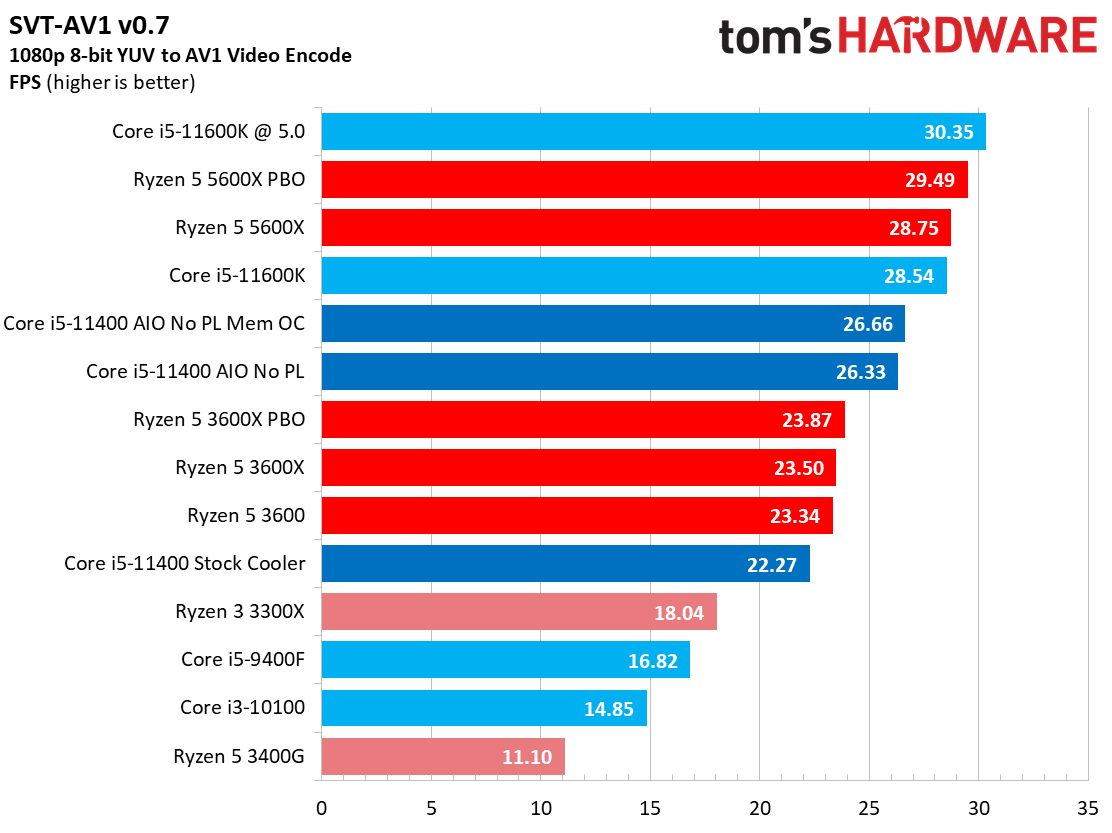
Our encoding tests include benchmarks that respond best to single-threaded performance, like the quintessential LAME and FLAC examples, but the SVT-AV1 and SVT-HEVC tests represent a newer class of threaded encoders.
Intel's Core i5-11400 takes the lead over its similarly-priced competitors in the LAME benchmark, while we see a near-tie across the board in FLAC. We see larger gains for the 11400 in the threaded SVT-AV1 and HEVC encoder tests, but only after we lifted the power limits and used a more powerful cooler.
Switching gears to HandBrake, which we test in both AVX-light x264 and AVX-heavy x265 flavors, shows that the Core i5-11400, again with the right cooler and lifted power limits, can beat the Ryzen 3000 chips. But the deltas are slim.
Get Tom's Hardware's best news and in-depth reviews, straight to your inbox.
Web Browsing on Intel Core i5-11400
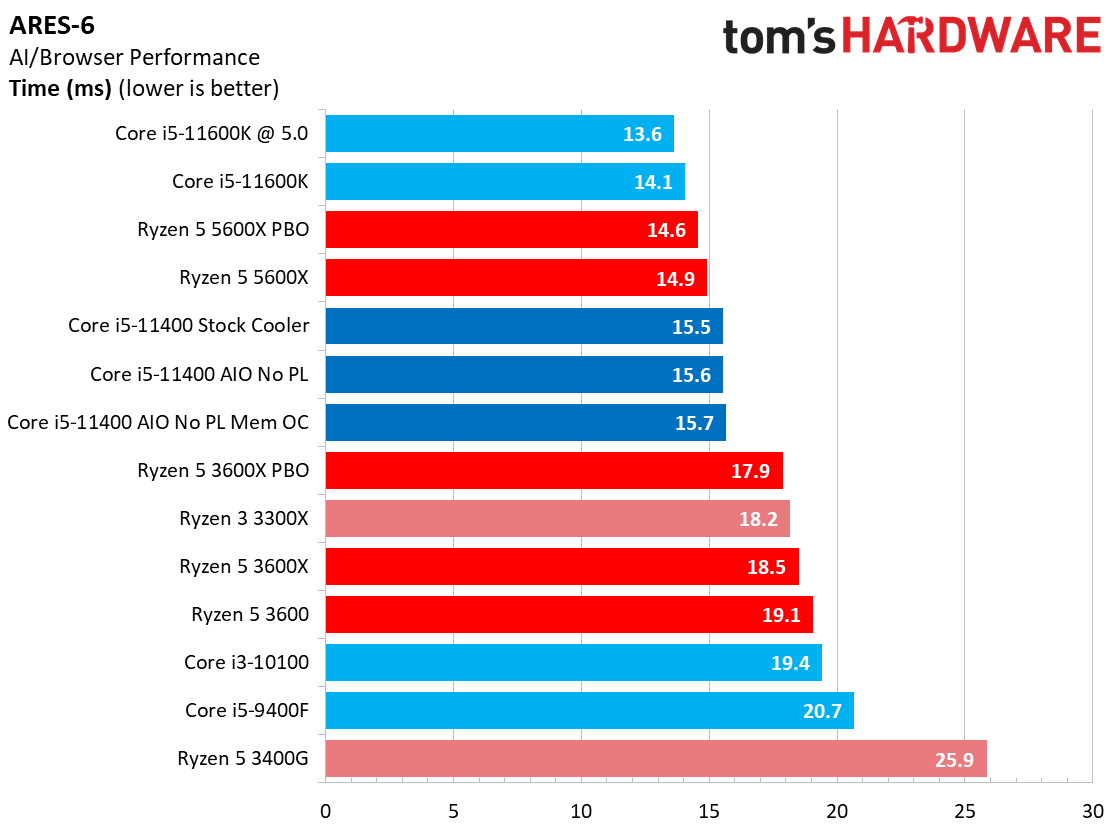
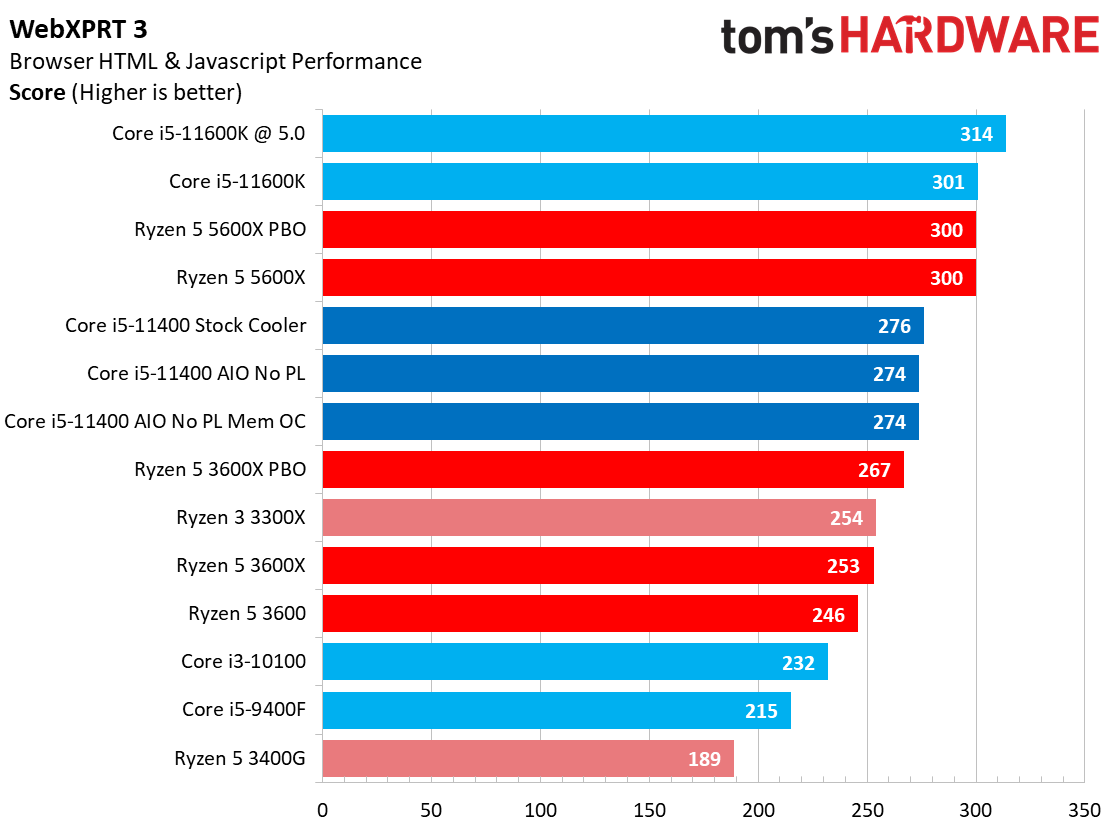
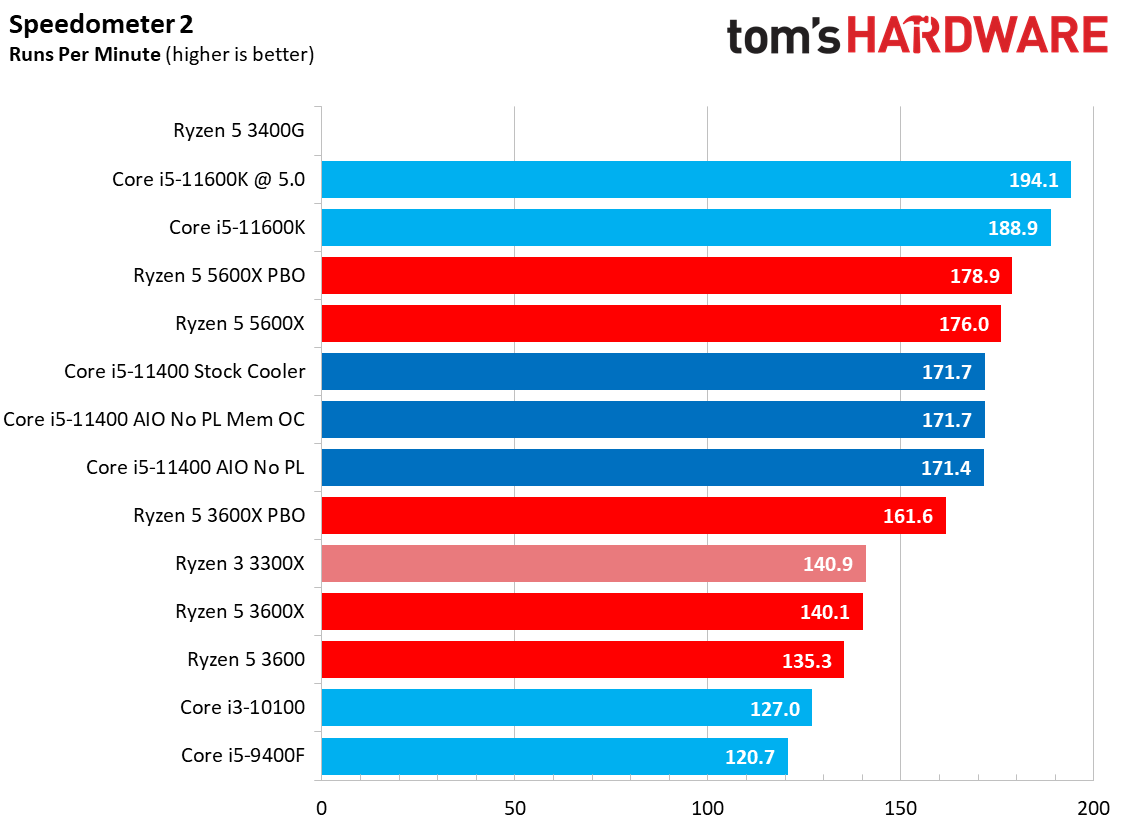
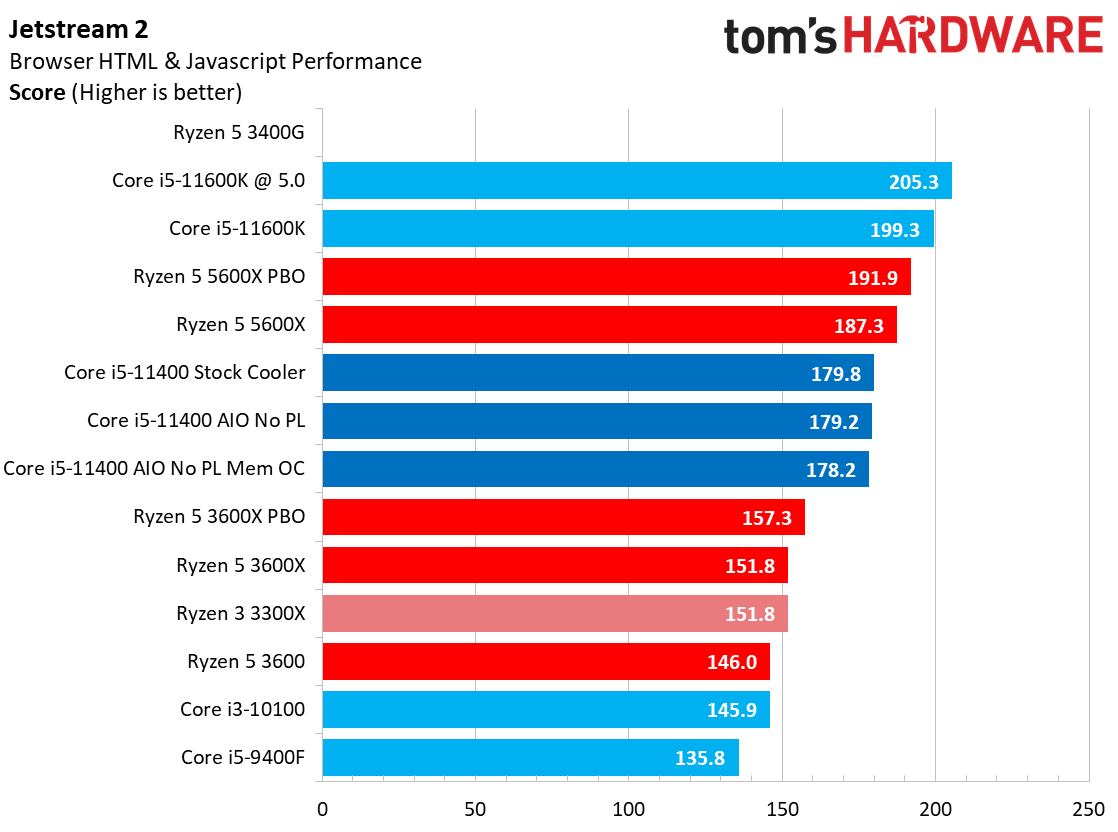
These benchmarks are almost exclusively lightly-threaded, so Intel's Core i5-11400 takes an easy lead against the Ryzen 3000 chips.
Office and Productivity on Intel Core i5-11400
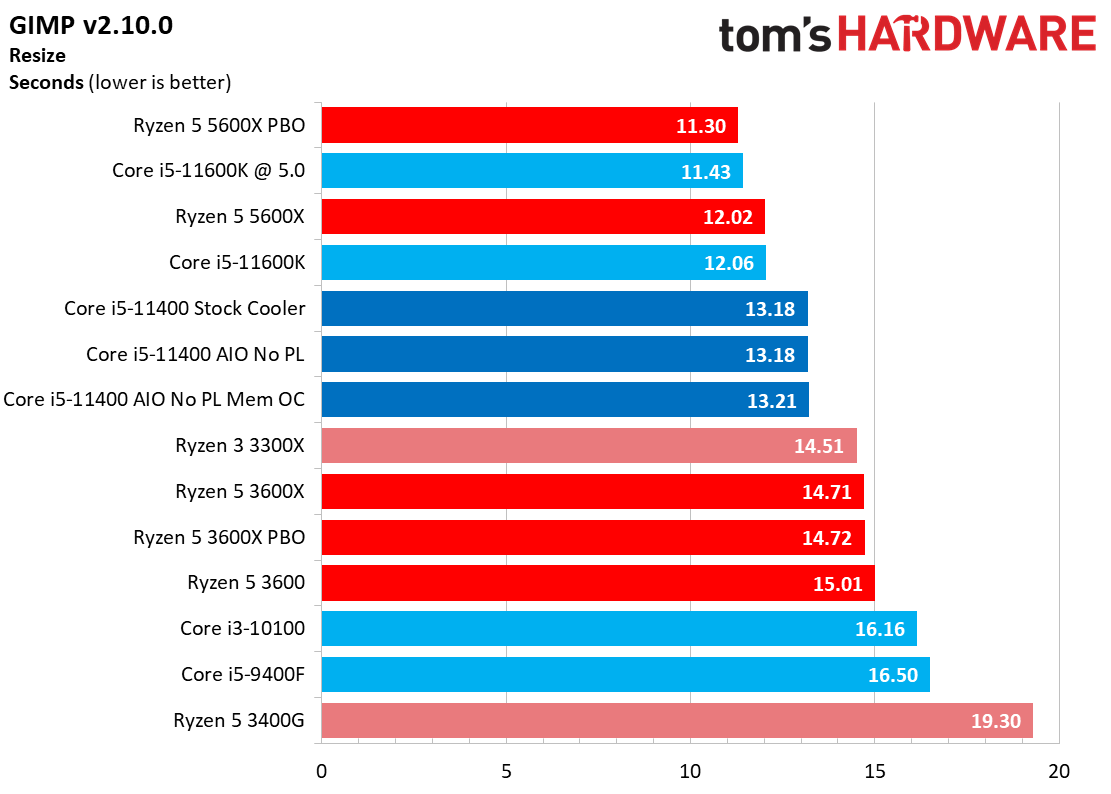
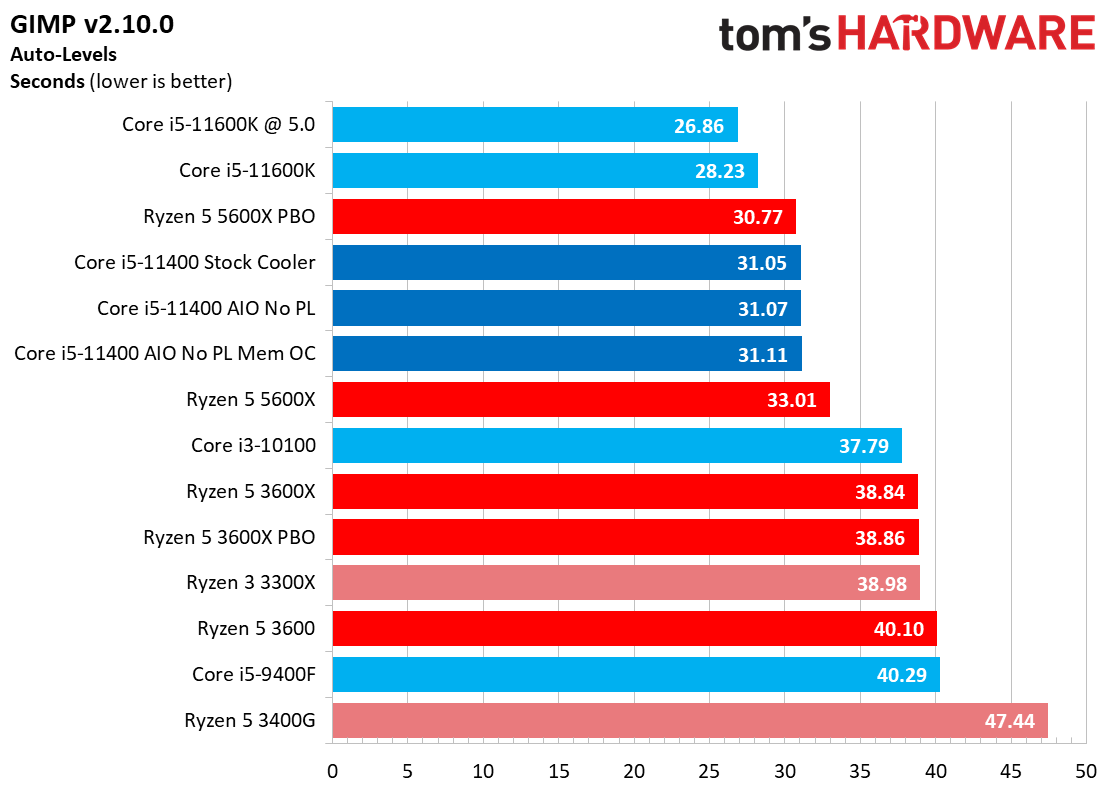
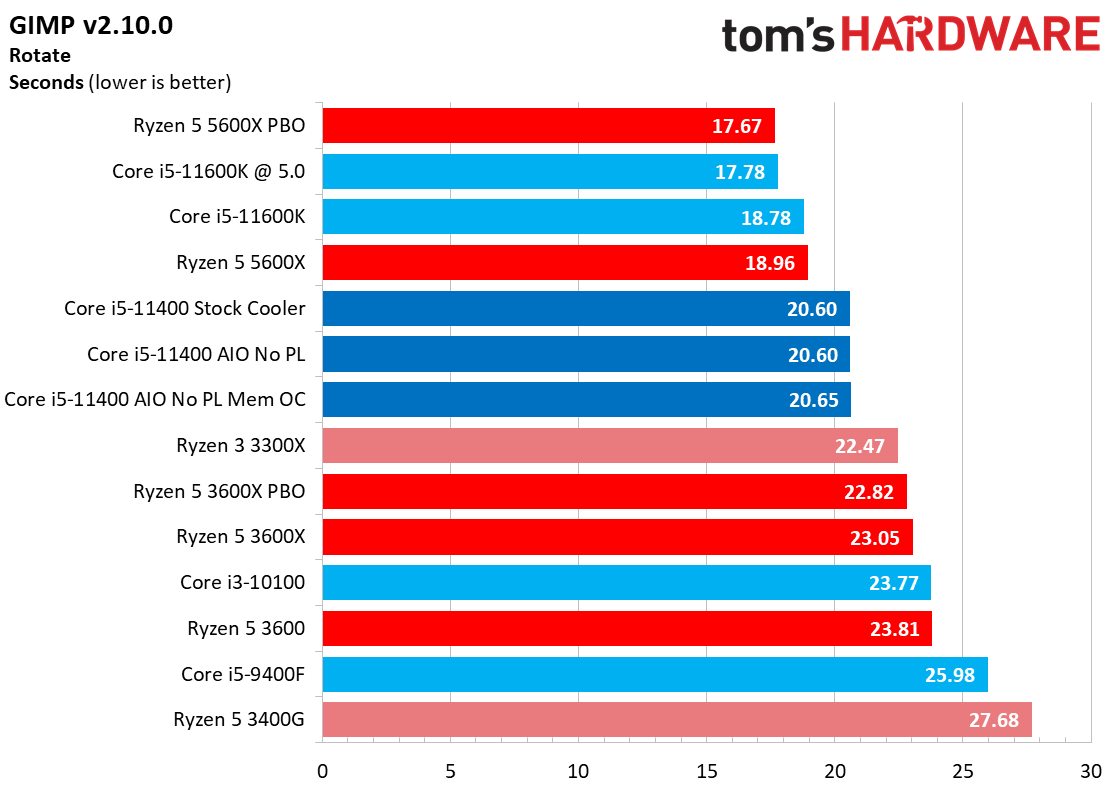
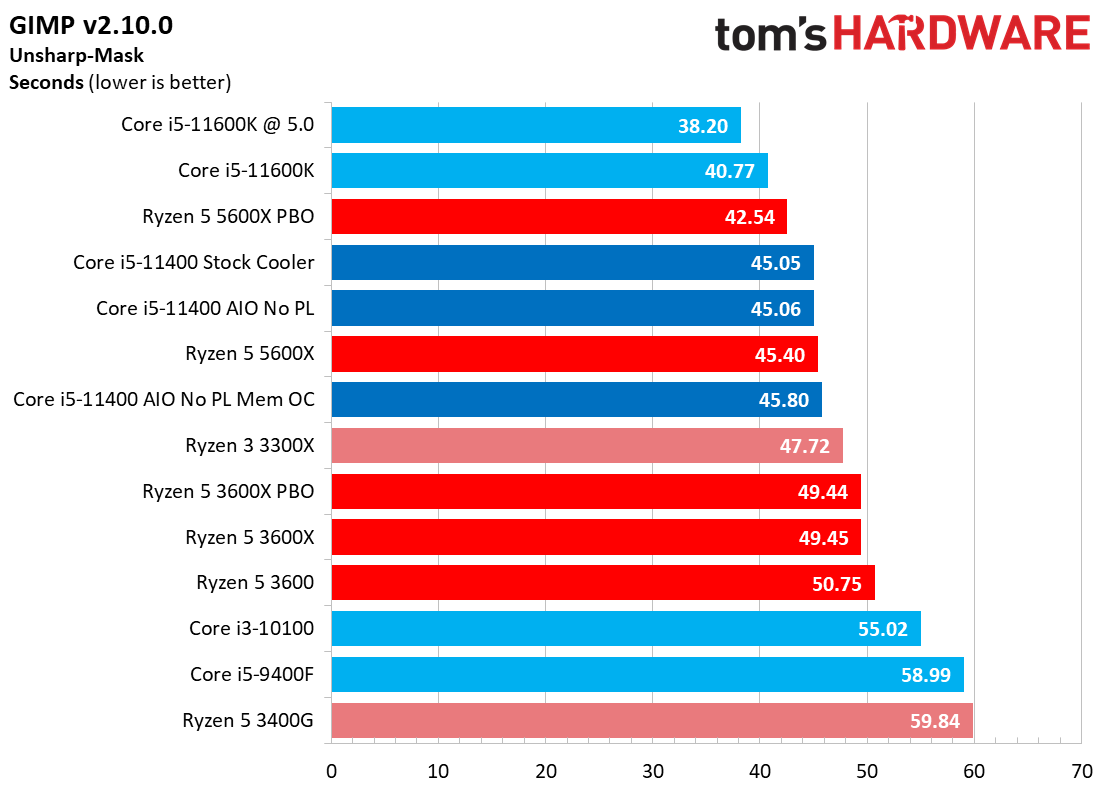
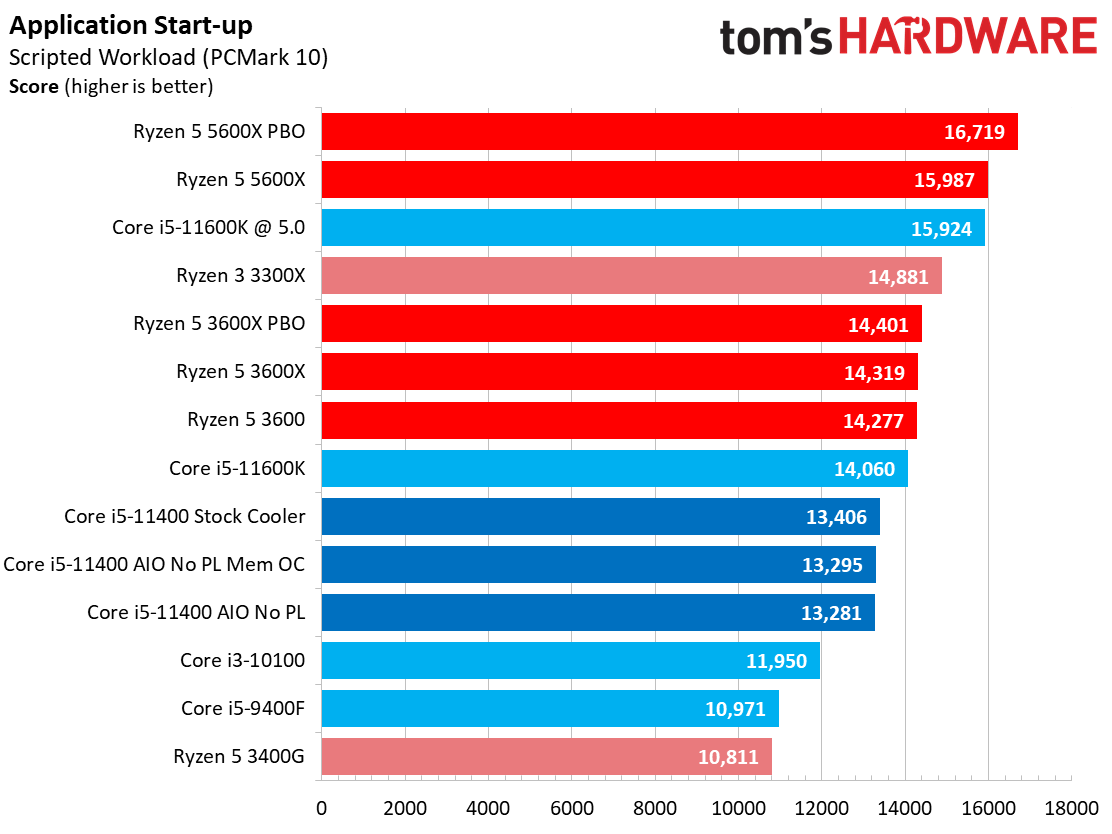
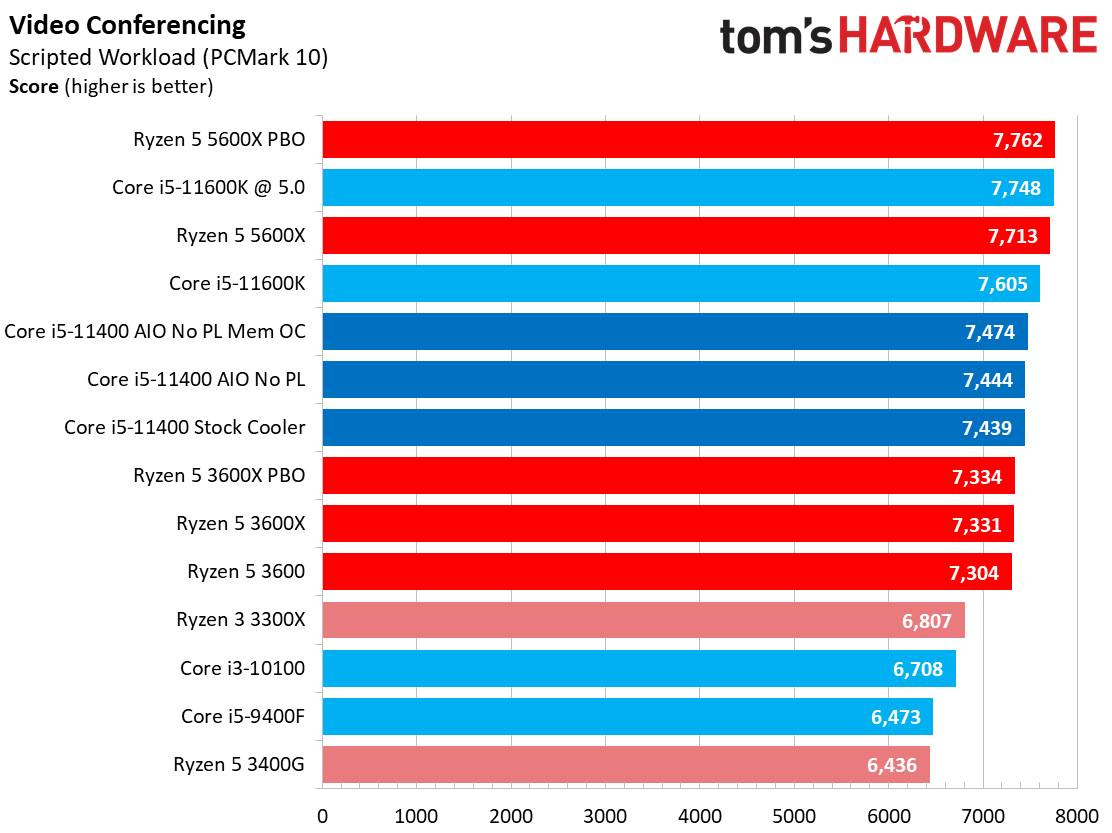
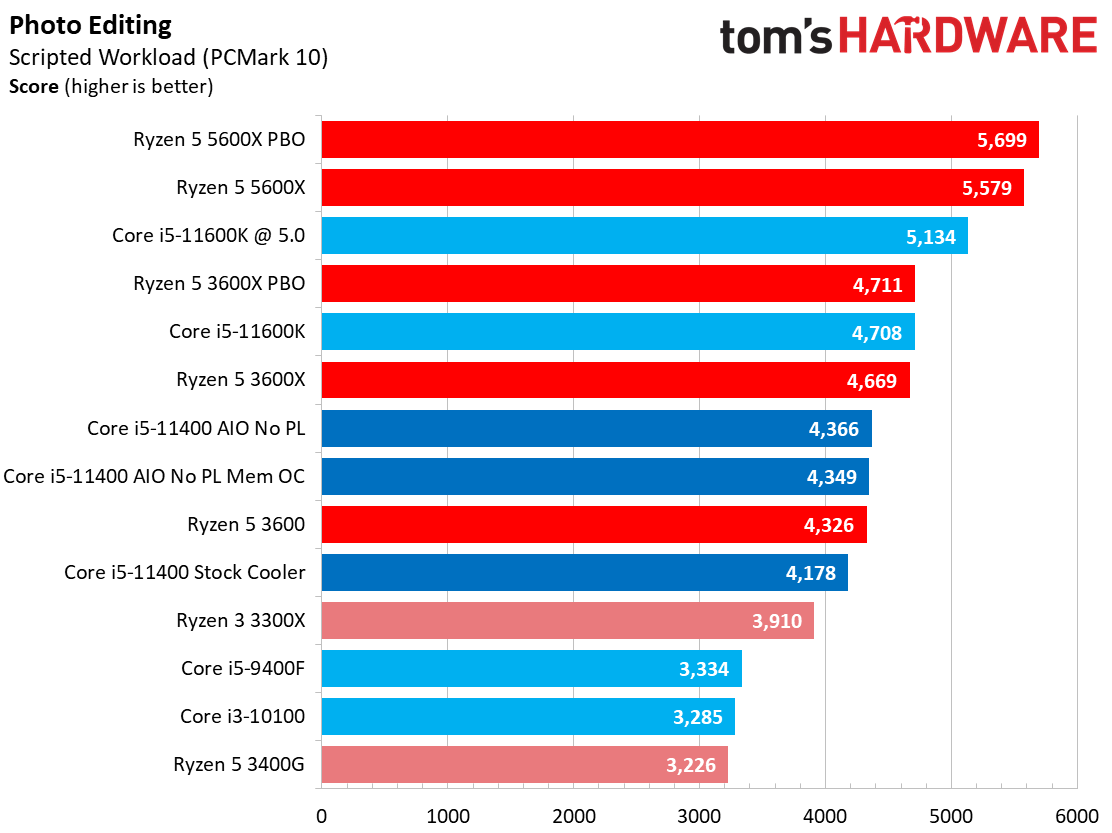
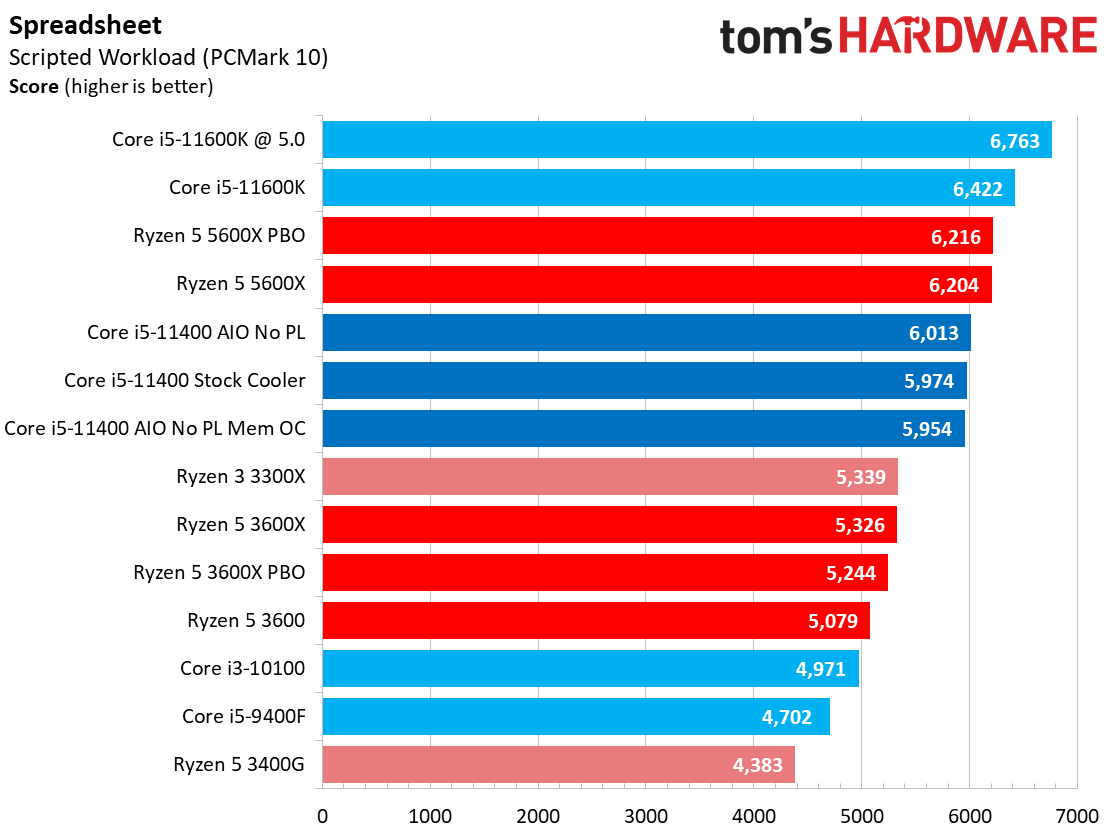
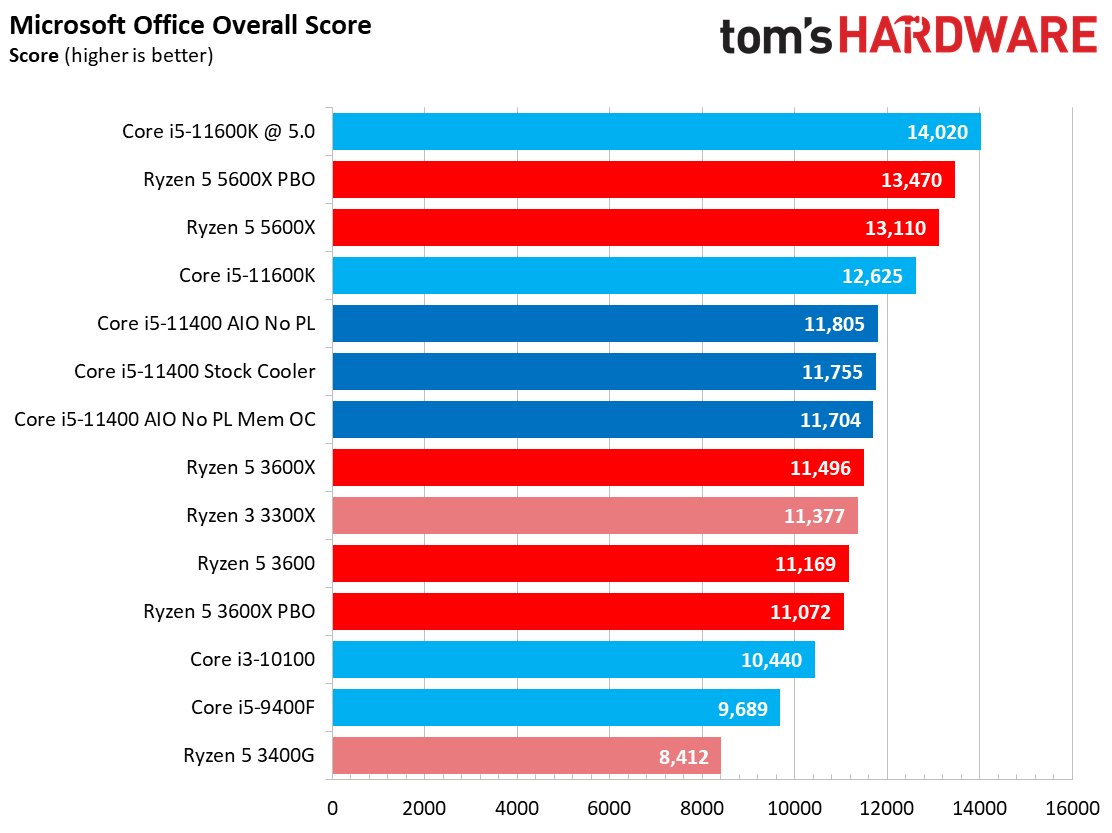
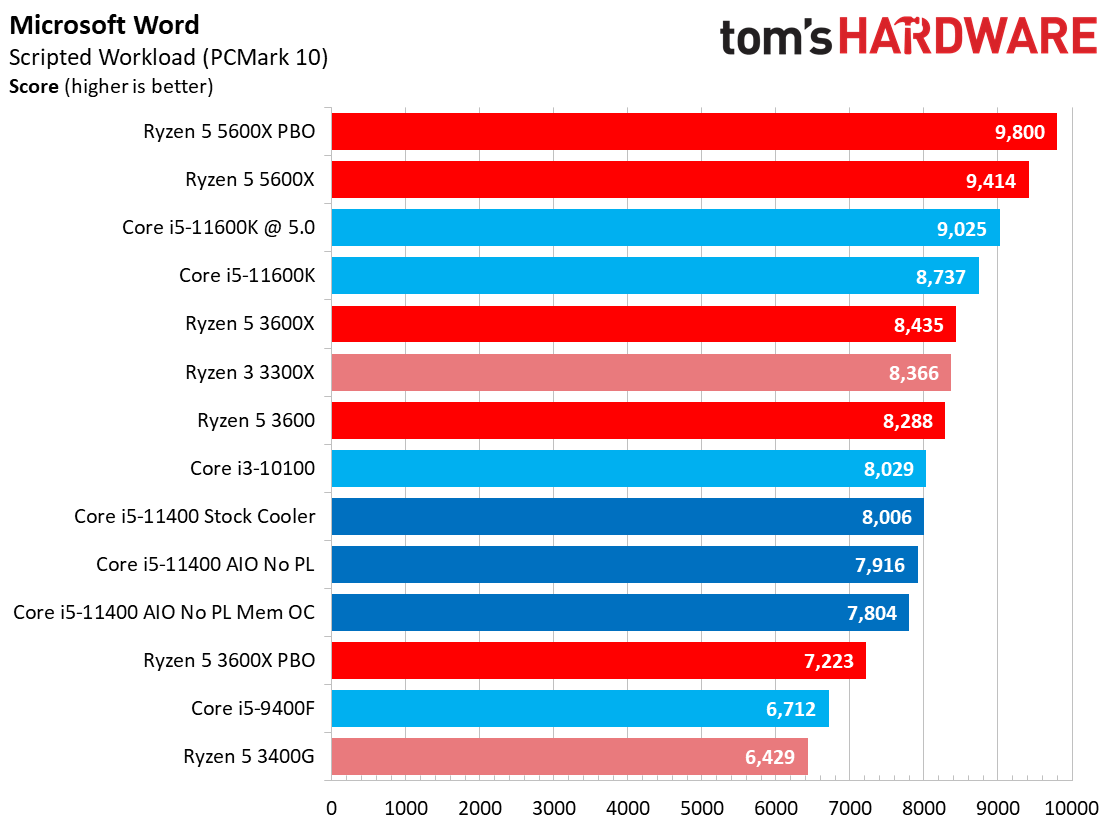
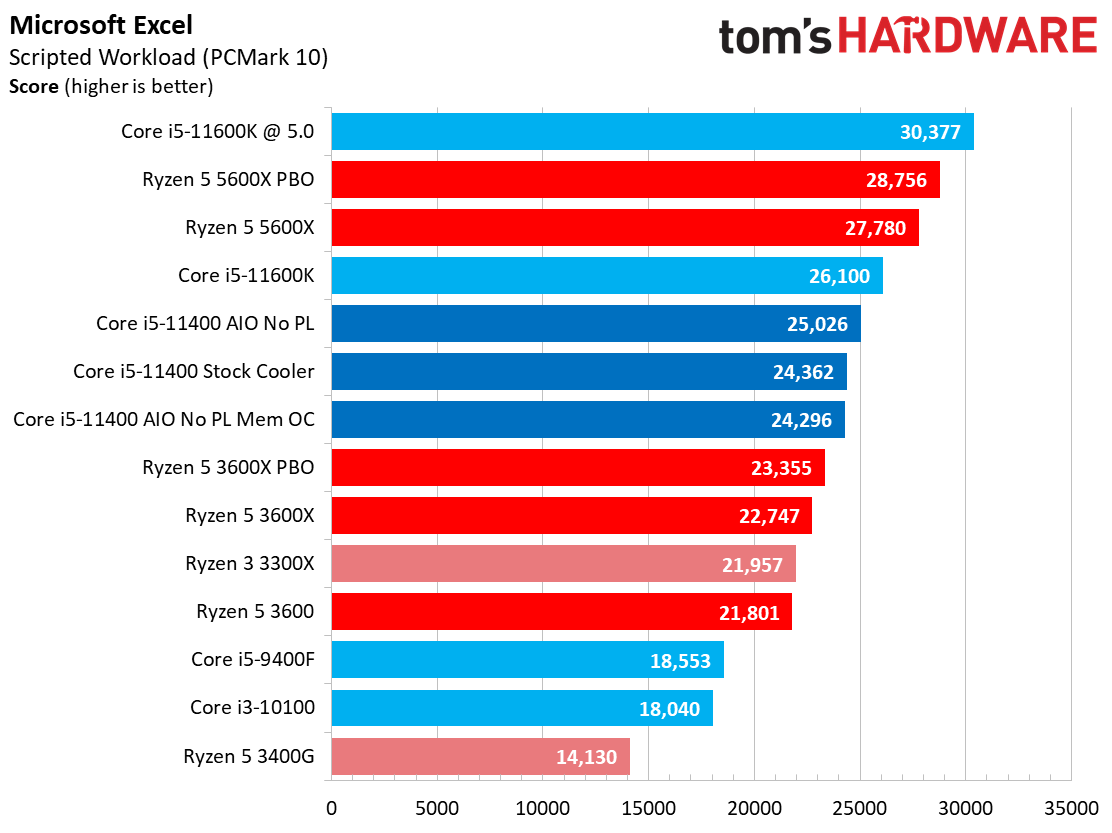
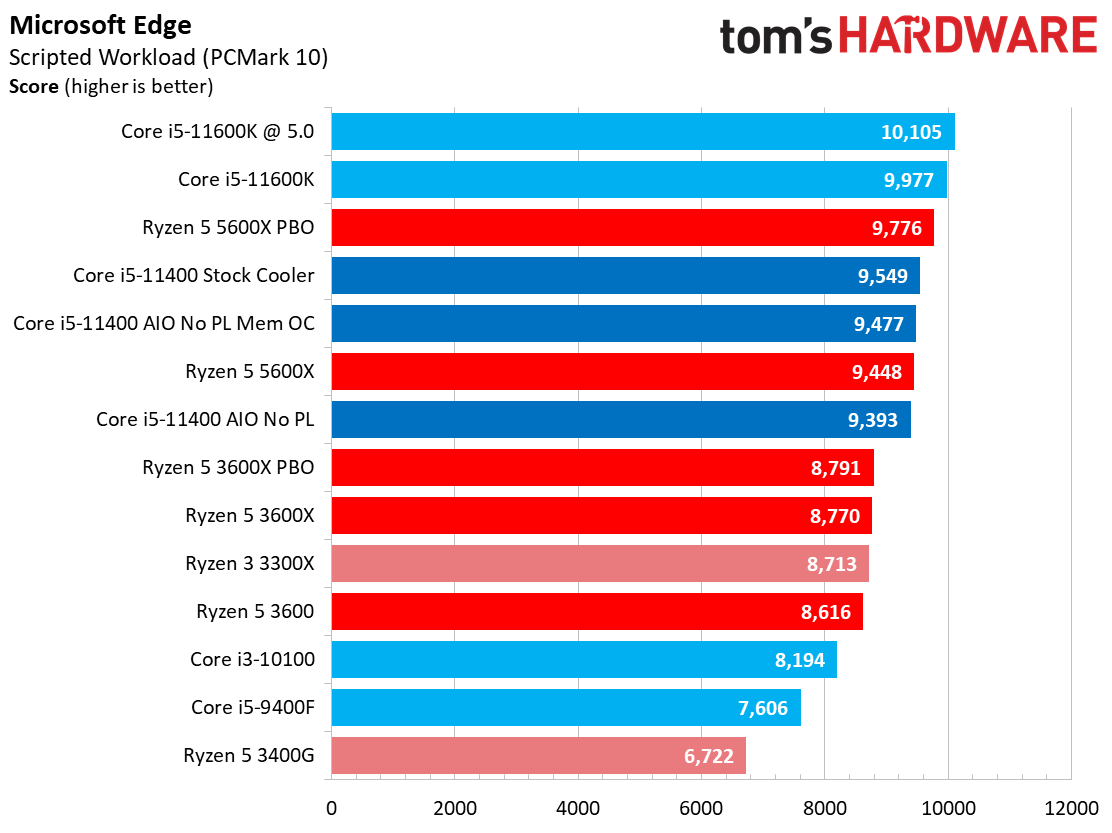
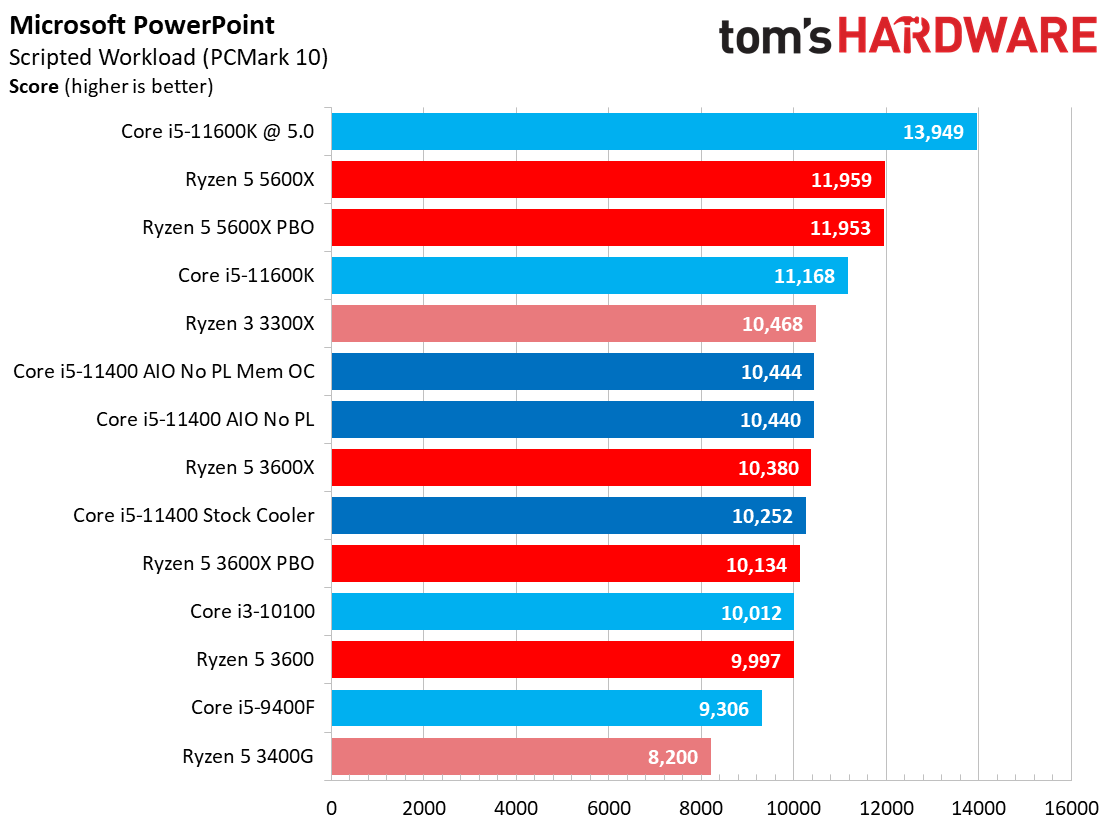
Our GIMP benchmarks respond exceedingly well to single-threaded performance, and here we see a similar trend to the web browser tests — the Core i5-11400 takes the lead. AMD still holds sway in a few of the tests, like the multi-threaded PCMark 10 photo editing benchmark and the application start-up test, but this round of tests largely goes to Intel.
Compilation, Compression, AVX Performance on Intel Core i5-11400
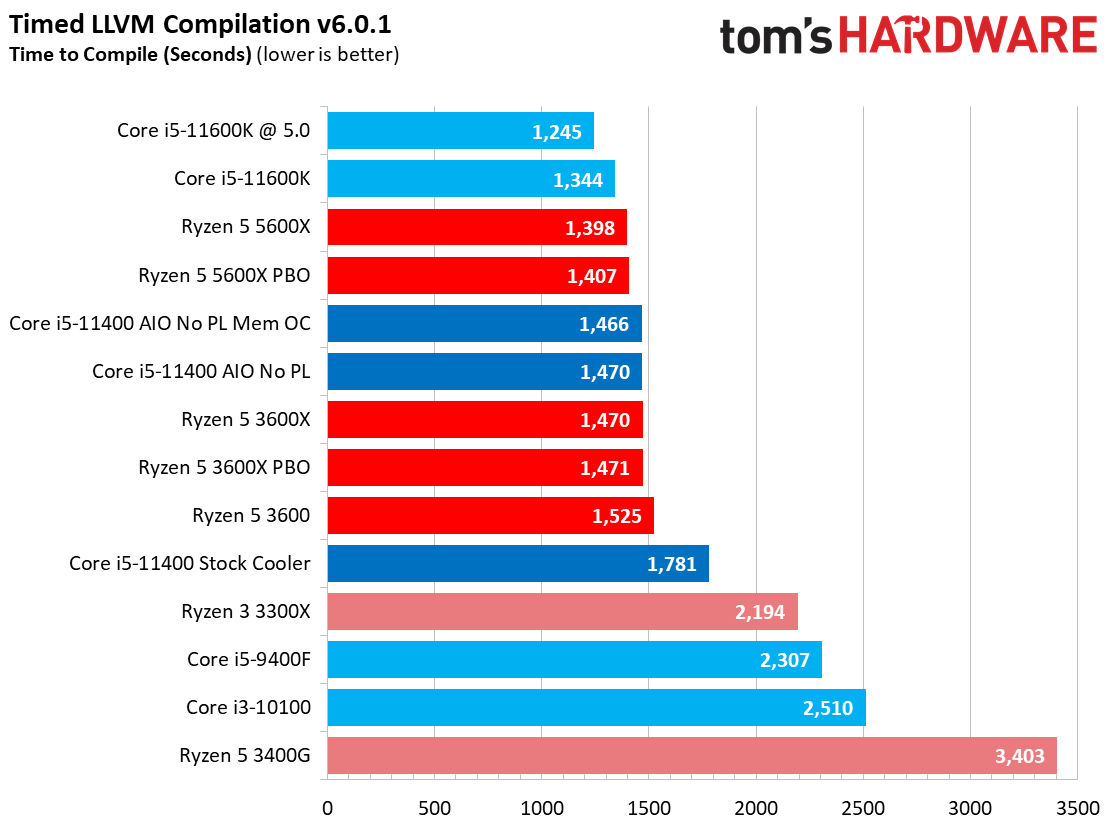
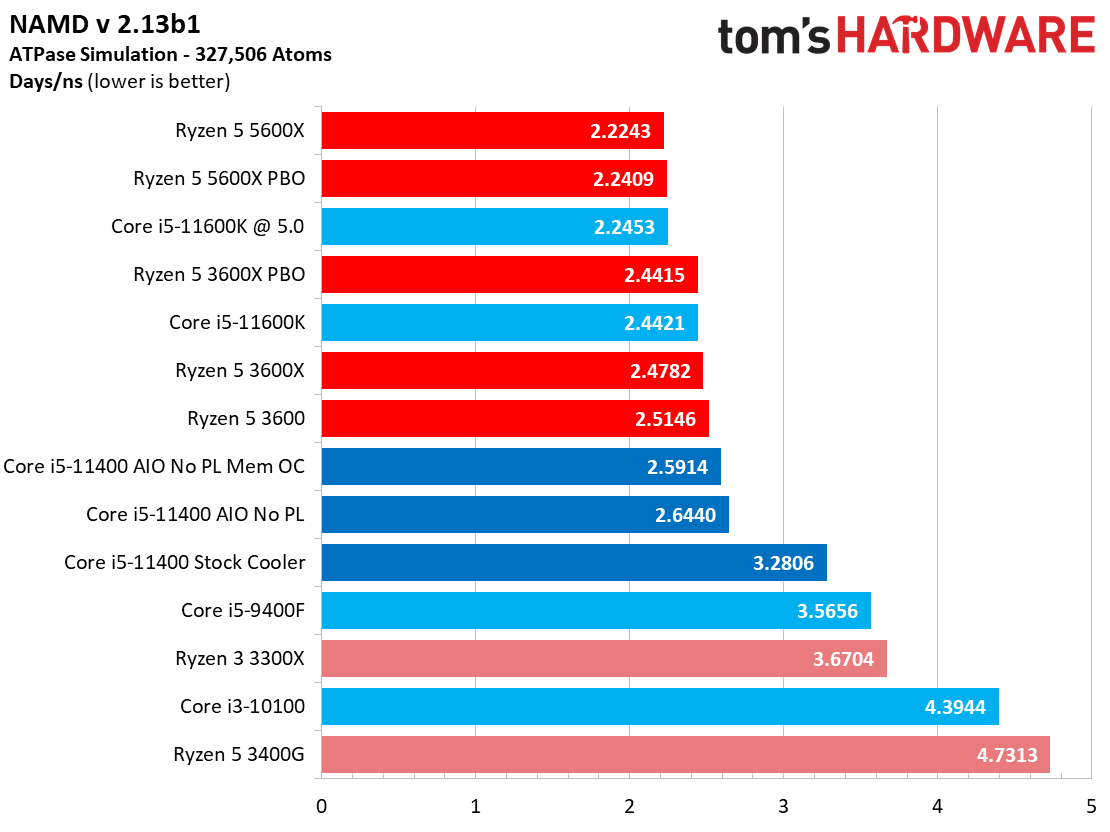
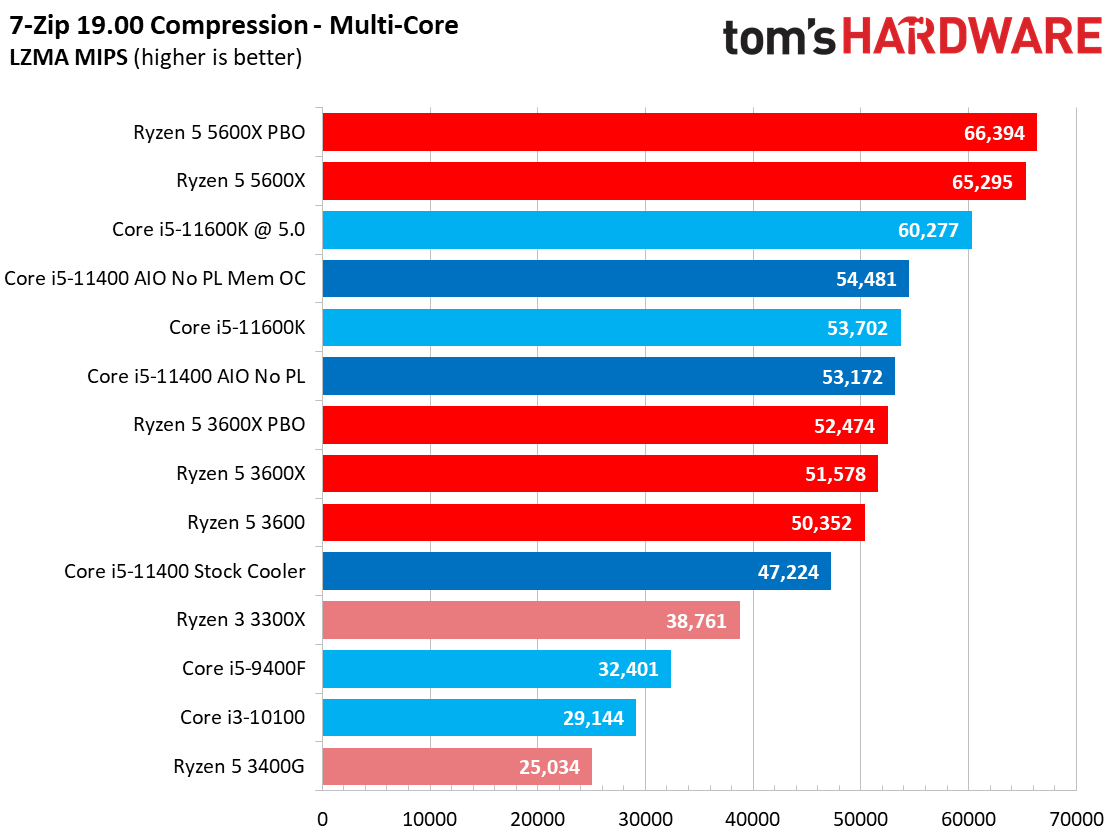
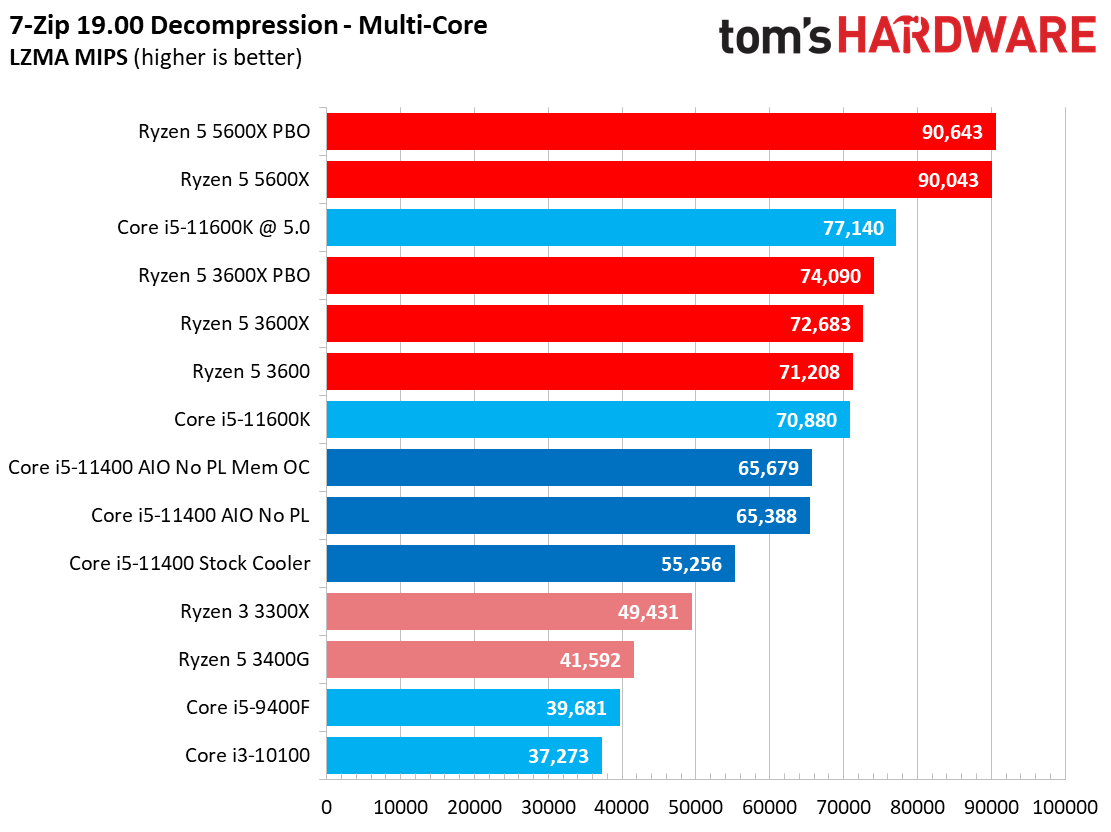
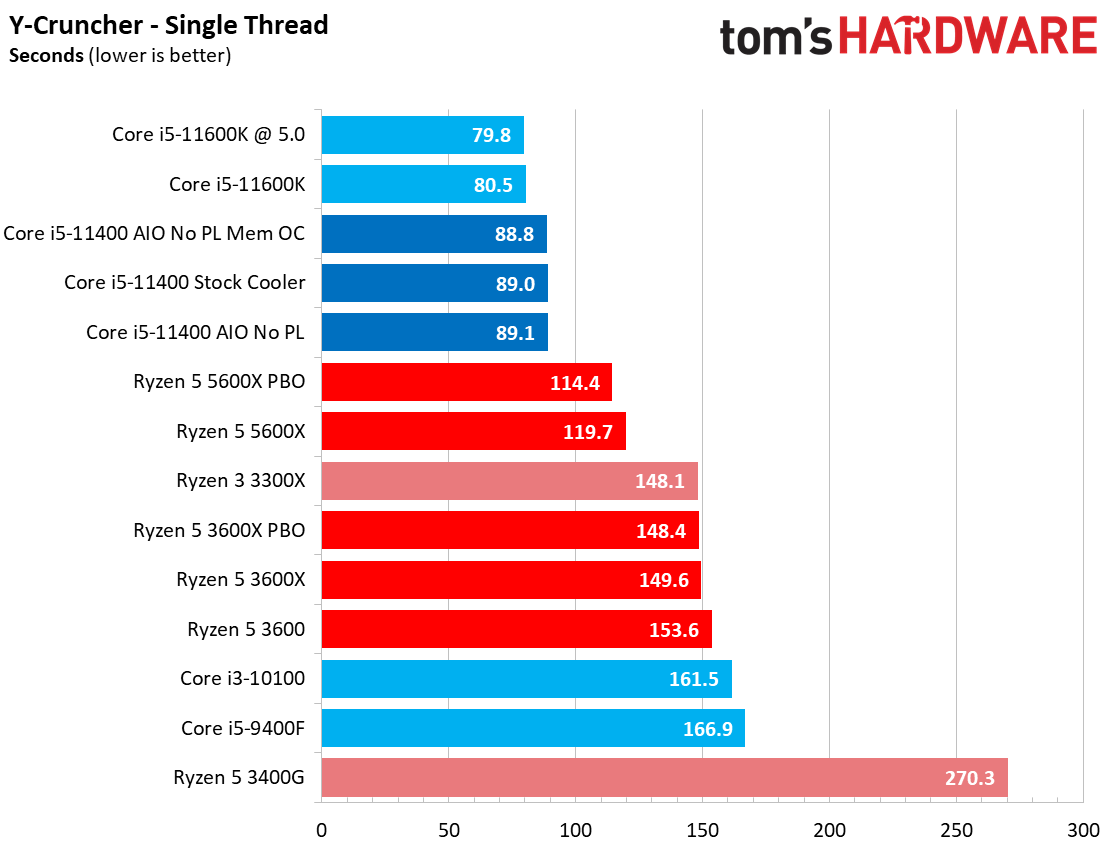
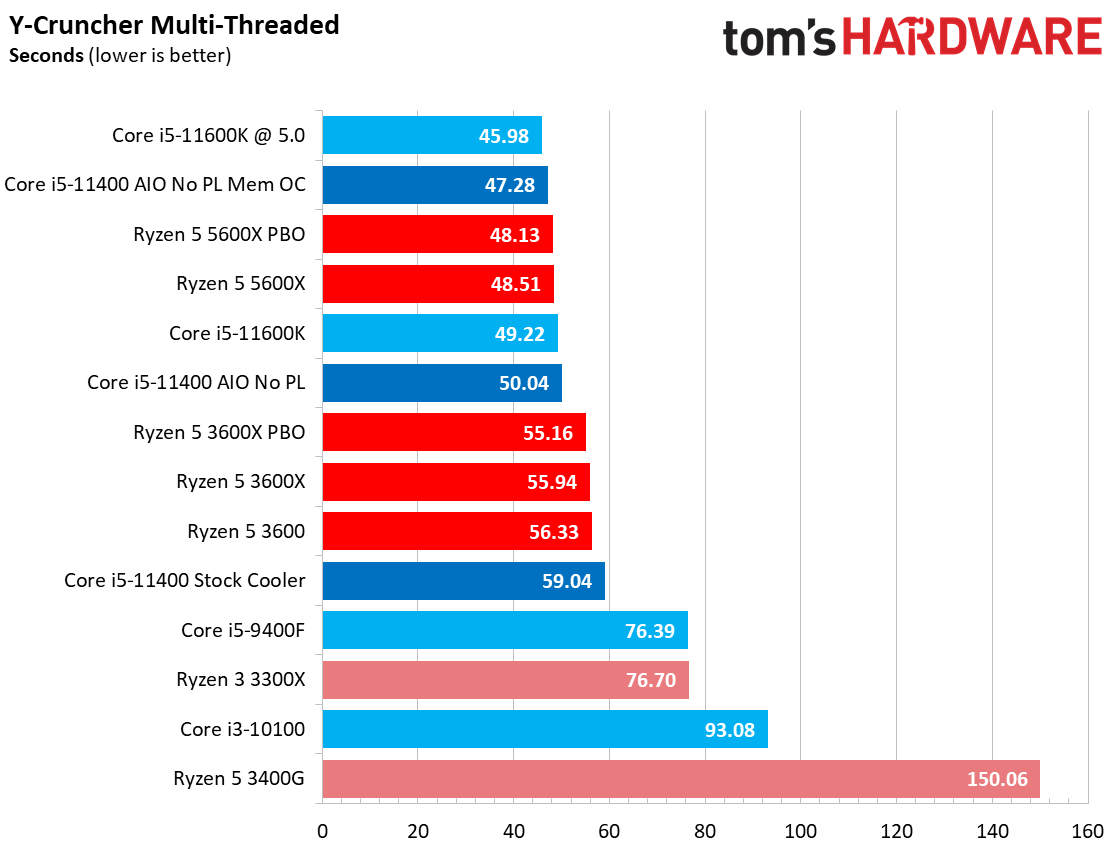
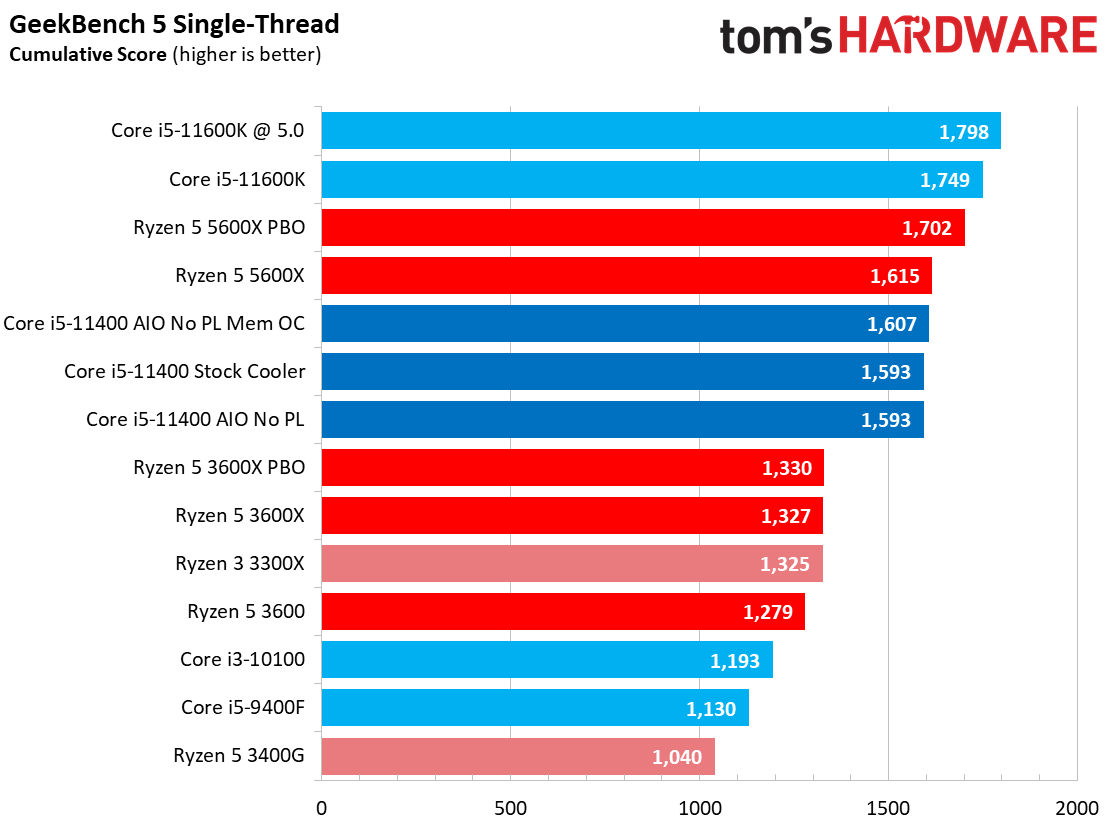
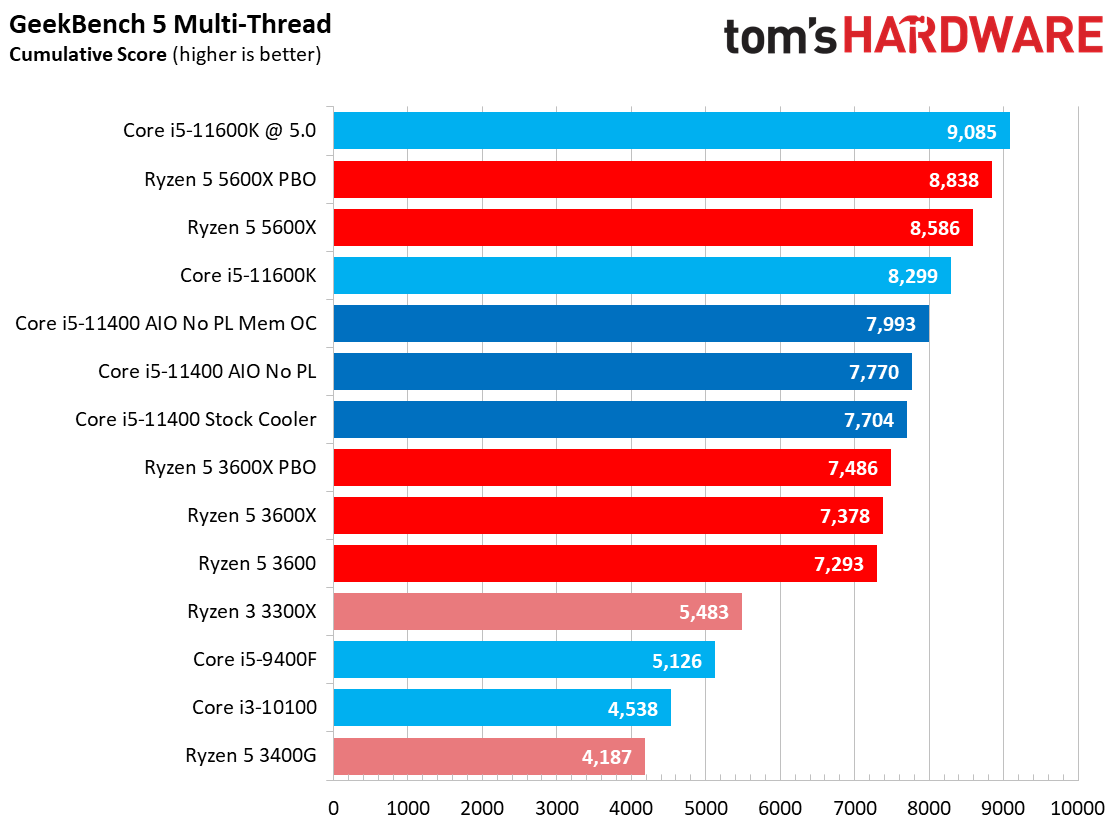
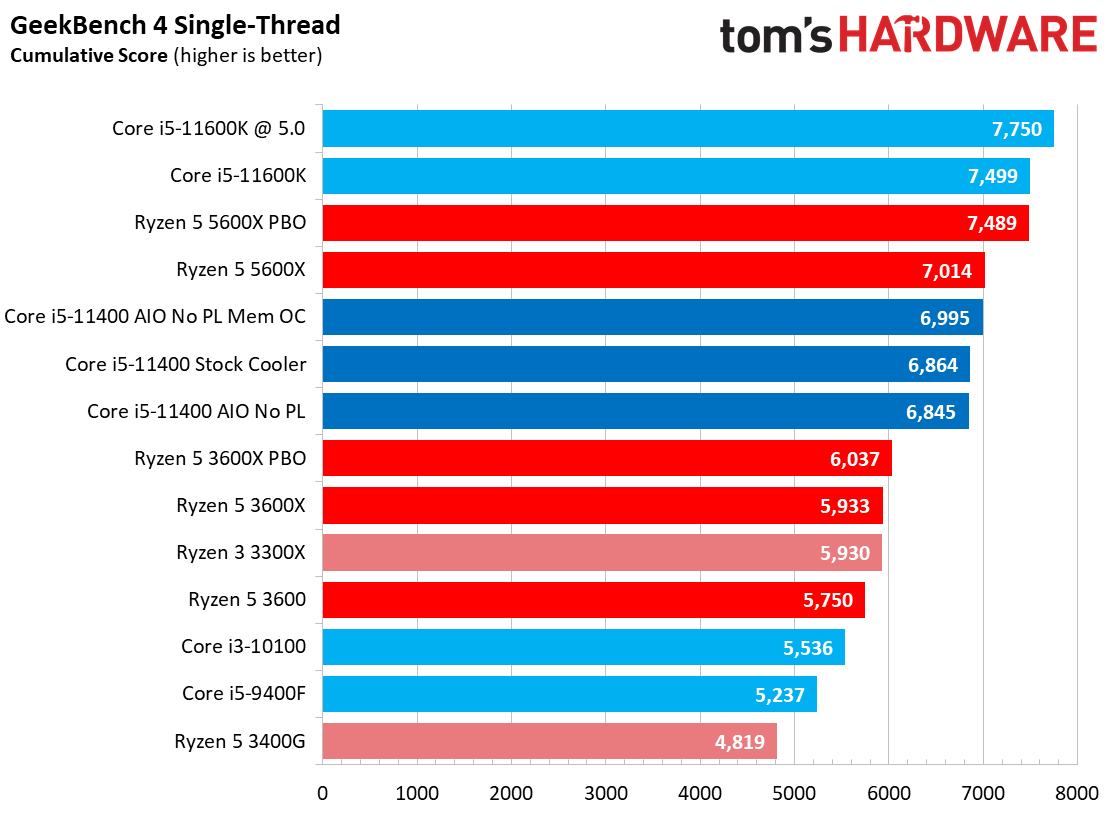
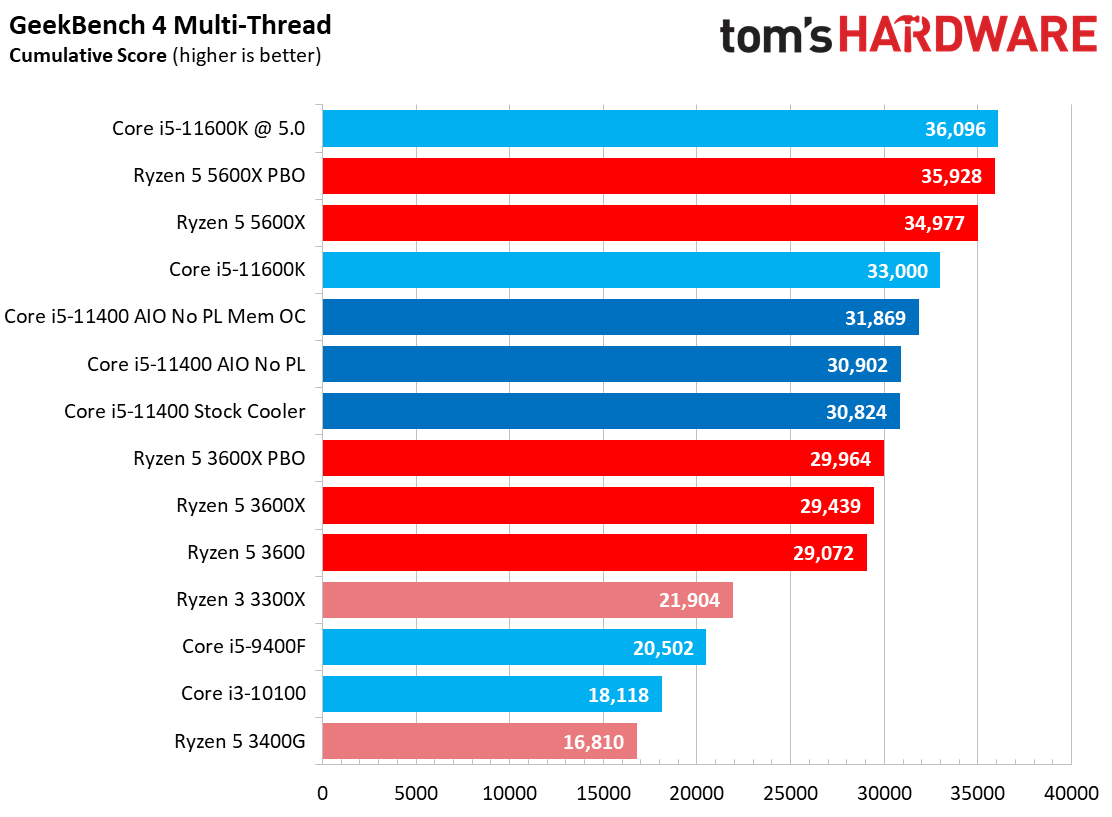
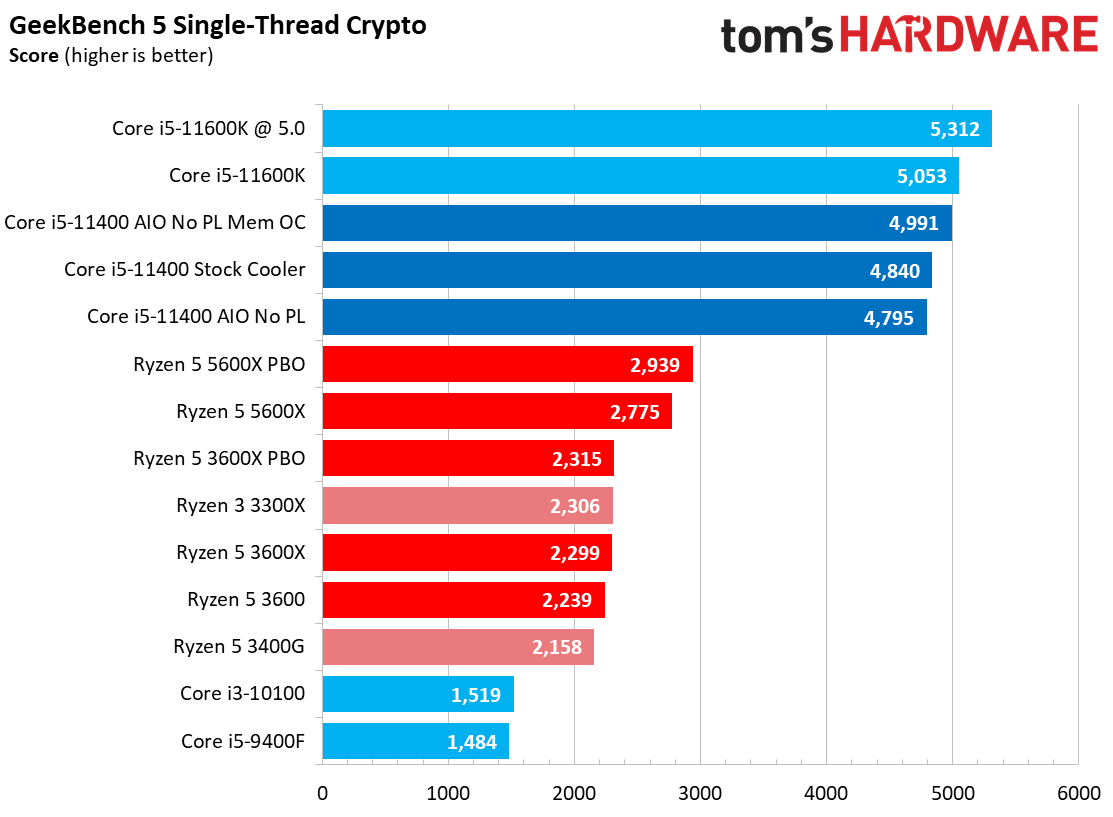
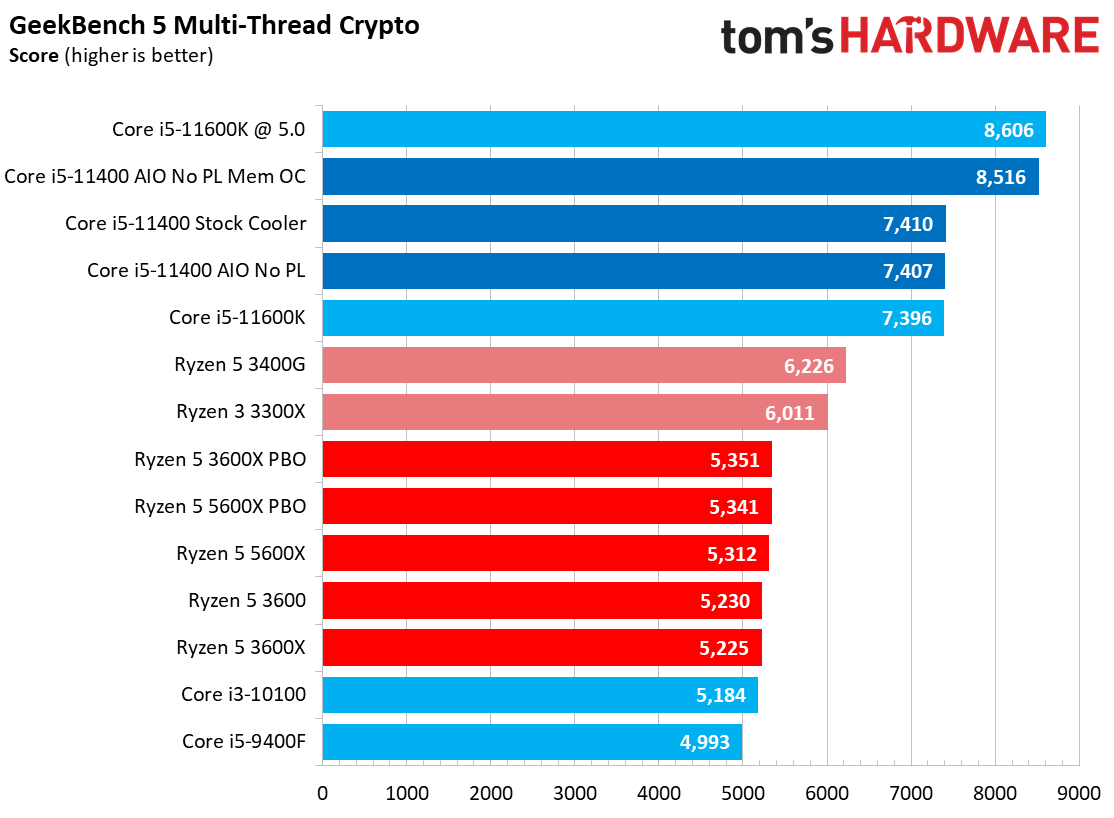
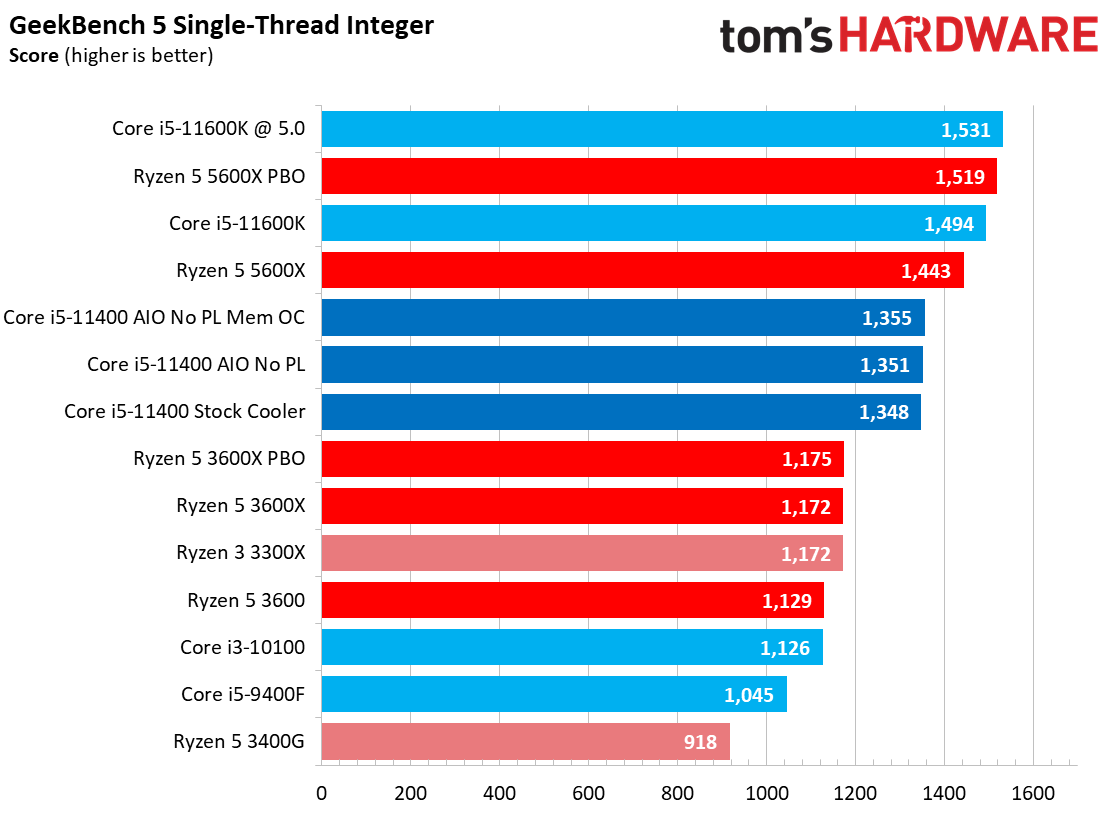
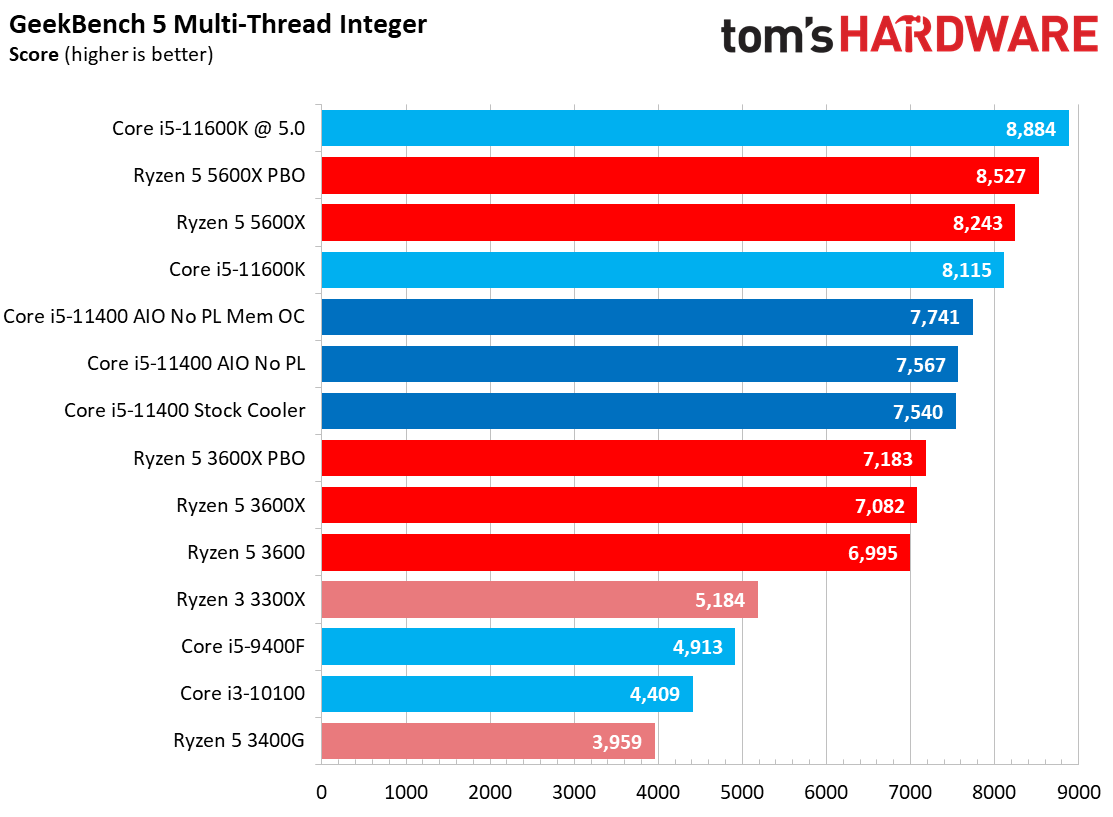
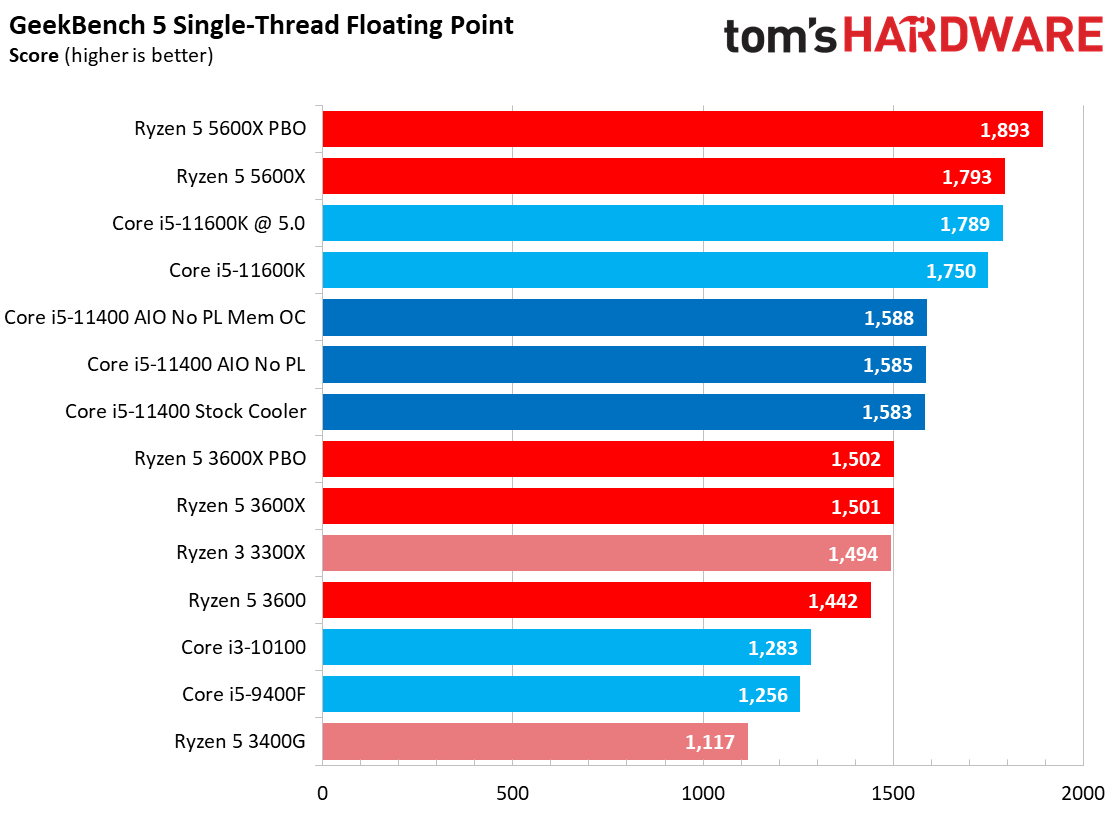
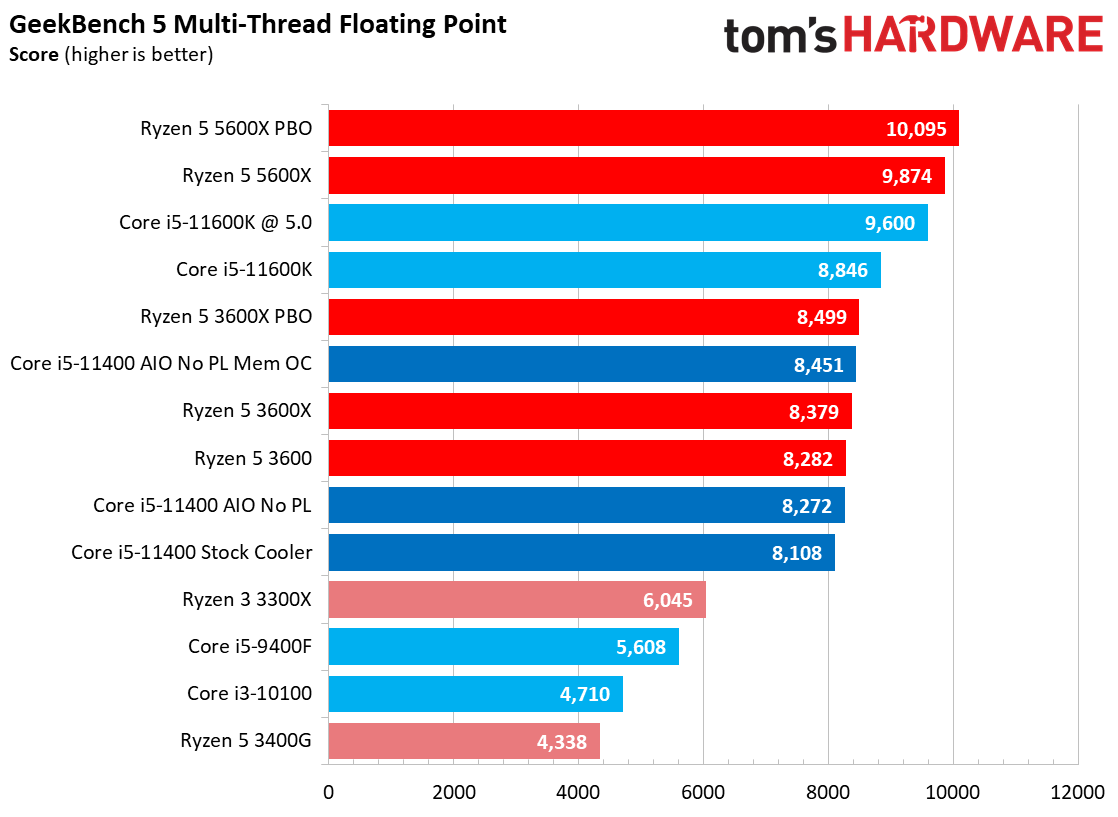
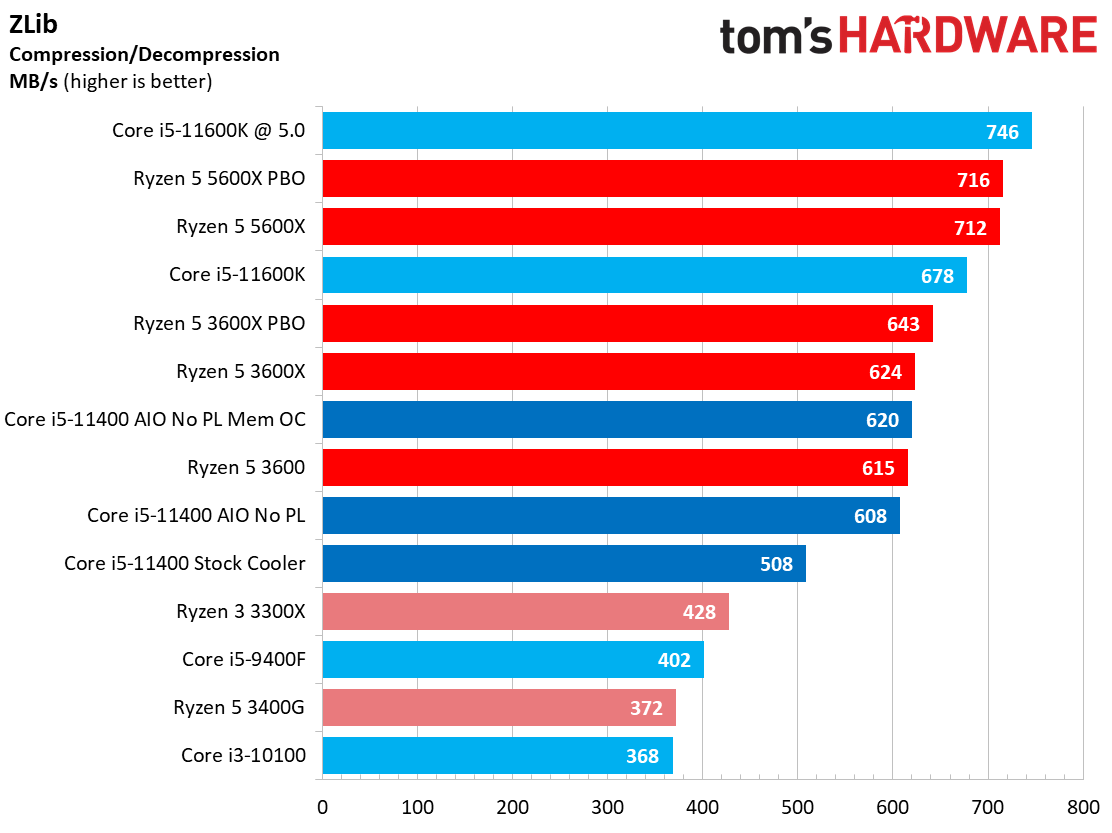
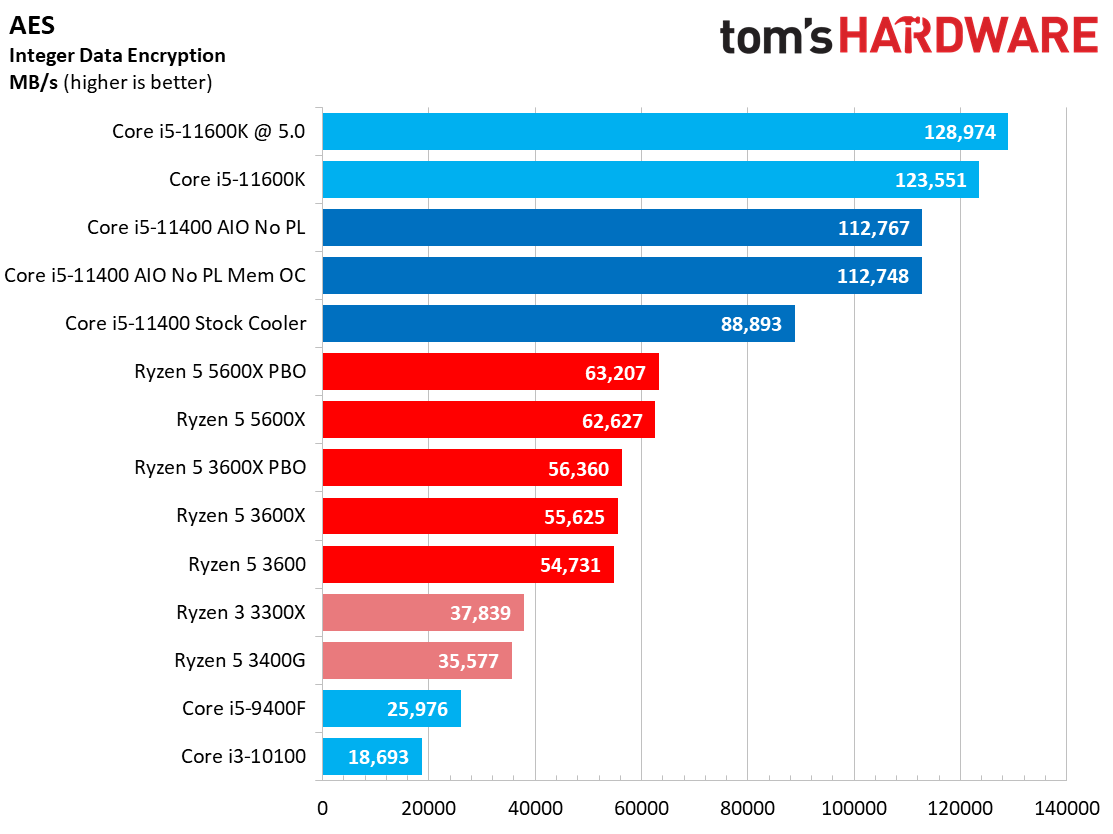
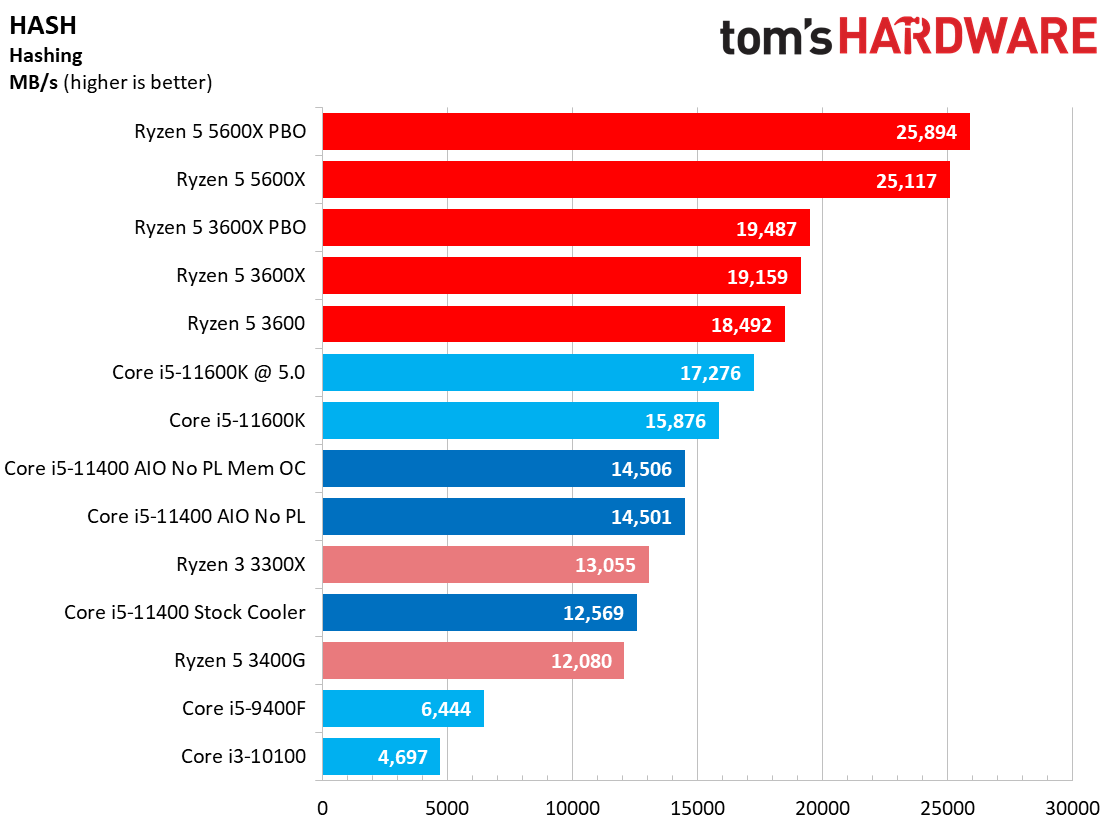
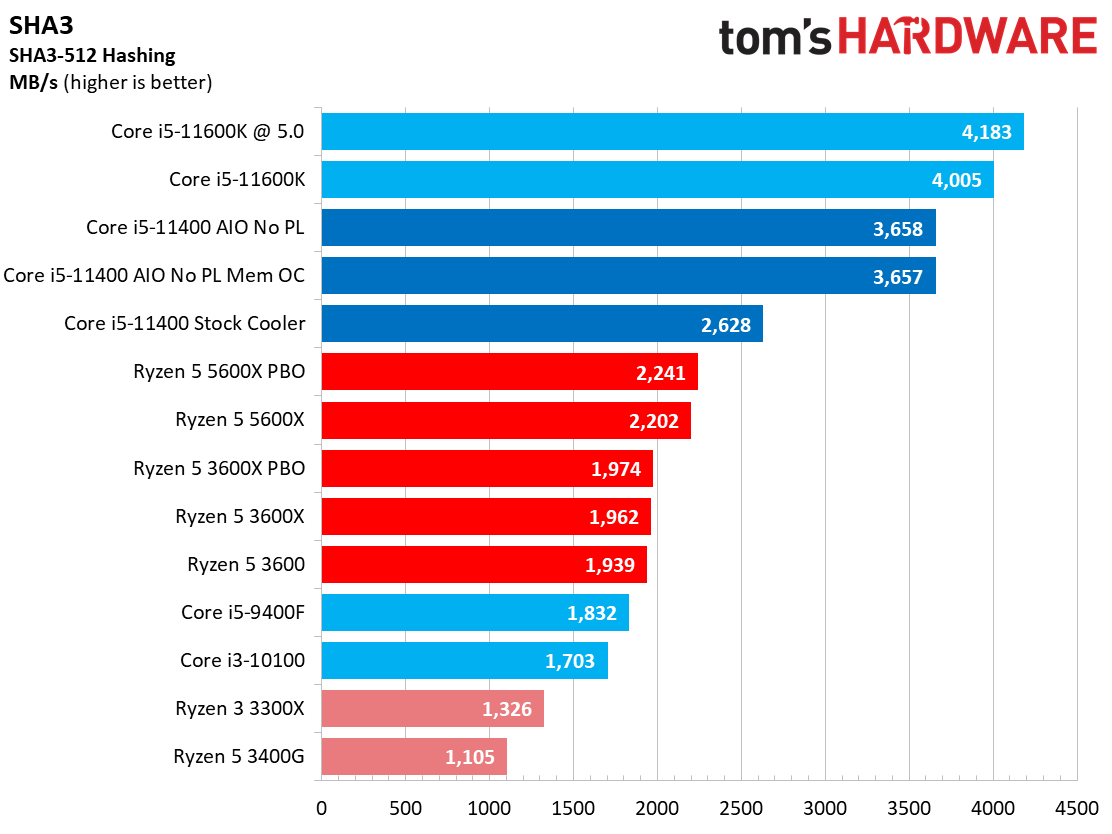
The timed LLVM compilation workload finds the Ryzen 3000-series chips running neck-and-neck with the 11400, even after we tuned the latter. We see that same trend emerge again in the NAMD tests.
Our y-cruncher tests are very interesting. This AVX-512 enabled benchmark yields tremendous generational performance gains in the single-threaded test, but performance doesn't scale as well to multiple cores. The densely-packed instructions press the Rocket Lake chips to the edges of their power envelope, which likely results in limited scaling.
The Core i5-11400 takes a notable win in the Geekbench 5 cryptography, AES encryption, and SHA3 benchmarks due to architectural enhancements for these types of workloads.
MORE: Best CPUs
MORE: CPU Benchmarks and Hierarchy
MORE: All CPUs Content
Current page: Intel Core i5-11400 Application Benchmarks, The TLDR
Prev Page Intel Core i5-11400 Gaming Benchmarks Next Page Uncontested Pricing Meets Strong Gaming Performance
Paul Alcorn is the Editor-in-Chief for Tom's Hardware US. He also writes news and reviews on CPUs, storage, and enterprise hardware.
-
caromero1965 Better to let Intel have lower margin sales and focus on servers and to some degree laptops. Follow the money.Reply -
sosofm Reply
I don't think that. The power consumption is double in comparison with 3600 and 5600x . More power consumption = more heat =better cooling = more money.Why_Me said:The Ryzen 3600 is dead man walking. -
punkncat Replysosofm said:I don't think that. The power consumption is double in comparison with 3600 and 5600x . More power consumption = more heat =better cooling = more money.
Under the most predominant use these will see a stock cooler should be (mostly) fine. A "gamer" would (probably not really be looking at) budget in a better cooling option anyway, IMO.
The energy cost difference is on the level of a candy bar and a soda level for the year. -
octavecode 2x Ryzen 3600 less power consumption than a single i5 11400, but intel gets the crown?Reply
No thanks... -
hotaru251 Reply
except AMD likely will release a lower tier cpu as it took a bit for that to happen even last gen. (and when your CPU are selling out basically immediately no need to release a cheaper one yet)punkncat said:This feels much like a replay of 2017, in reverse.... -
Why_Me Replysosofm said:I don't think that. The power consumption is double in comparison with 3600 and 5600x . More power consumption = more heat =better cooling = more money.
The 11400F w/stock cooler mops the floor with the 3600 . Add a $30 - $40 aftermarket cooler, remove the power limits in the bios and it gets even worse for the 3600. There's multiple reviews on the net to back that up.octavecode said:2x Ryzen 3600 less power consumption than a single i5 11400, but intel gets the crown?
No thanks...
https://overclock3d.net/reviews/cpu_mainboard/intel_core_i5_11400f_and_asus_b560_plus_prime_review/1Intel Core i5 11400F and ASUS B560 Plus Prime Review
https://www.tomshardware.com/news/intel-core-i5-11400-reviewIntel Core i5-11400 Review
https://www.guru3d.com/articles_pages/intel_core_i5_11400f_processor_review,1.htmlIntel Core i5-11400F Review
https://www.techspot.com/review/2232-intel-core-i5-11400f/Intel Core i5-11400F Review
https://www.profesionalreview.com/2021/04/26/intel-core-i5-11400f-review/Intel Core i5-11400F Review
pOpWJCWYa6k
crU9V1GNocI -
JediWombat Utter nonsense. Intel's brand new processor outperforms AMD's almost-two-year-old chip? So it should! It's two years newer!Reply
Tom's Hardware is so blatantly biased towards Intel these days, you should be embarrassed. -
helper800 Reply
If you see bias its because you are imagining things. Toms called it when AMD released the 3000 and 5000 series processors that they were better than intel's offerings at the time in their own respective ways. Though AMD costs more than this particular Intel processor, it took Intel breaking years of its own norms by adding so many features that AMD has had standard for over a decade that Intel effectively priced out its own top tier parts. It used to be that you had to pay the K tax to get overclocking on a 4 core 4-8 thread processor for almost 8 years. This is just one major norm intel had to break to remain relevant. Competition is good, and if AMD does not provide a compelling product at every price range Intel will come in with something good, and they did. Who cares about brand loyalty? We all win in these circumstances...JediWombat said:Tom's Hardware is so blatantly biased towards Intel these days, you should be embarrassed.